Paul's Mental Workshop, Special page: India
Paul's Mental Workshop- pg 1 | pg 2 | pg 3 | pg 4 | pg 5 | pg 6 | pg 7 | pg 8 | pg 9 |
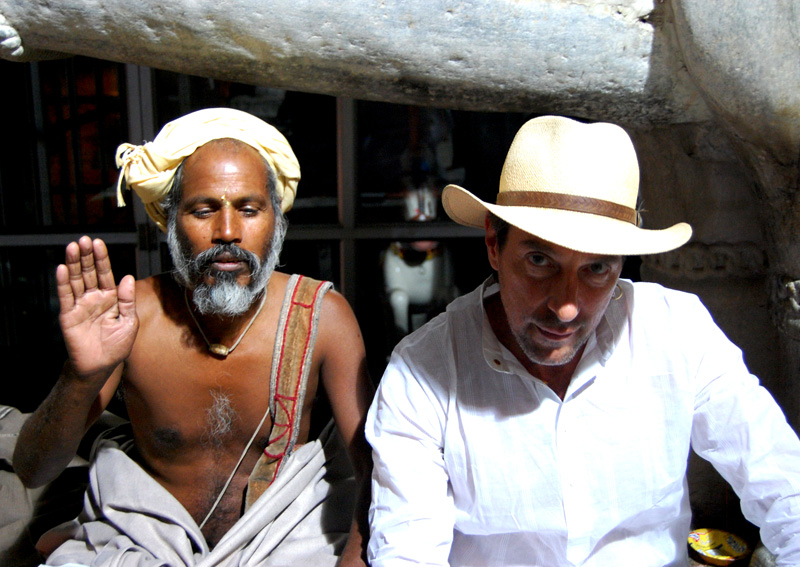
I haven't updated these pages in a couple of months because I was travelling in India. It was a difficult decision but I decided not to take a laptop with me. I wanted to cut the ties with my western reality during the time I travelled but, since I couldn't stop writing, I bought a pad & ballpoint pen & jotted notes & impressions manually. Practically the first hand-written words I've scribbled in years: what a mess! Footnotes, crossed-out lines, addendums referenced on further pages & all without even the first attempt at editing or even re-reading. Another example of how the machine I write on now in lovely word.doc has changed our lives though we assimilated it as a mere slight improvement.
Mostly the writing is inspired directly by the place but from time to time they are simply the thoughts I had while there. I marked the odd page with a date, but, much like my life, chronology & time span is irrelevant & so, rather than attempt to edit the pile into a more pleasing agglomeration I think I will just leave it in the raw. A bunch of impressions & musing written on the several thousand kilometre route I followed.
After getting back to Spain I packed-up & moved to California (the Orient, old Europe & the plastic west coast all within a few months, rather dizzying really) from whence I will now try to wade through the 120 pages of scrawling squiggles to try & extract an interesting presentation, good luck to me & to you, who I hope will enjoy reading it.
Instead of making the low-res images that illustrate this article clickable, I have put them, along with more photos of India, in a thumbnail gallery where you can click for proper enlargements. Some will show information when you hover, both below & on the thumbnail page.
India (18,450 words)
To he whose foot is covered with a shoe the earth seems all
carpeted in leather.
From the Hitopasheda, 12th century AD
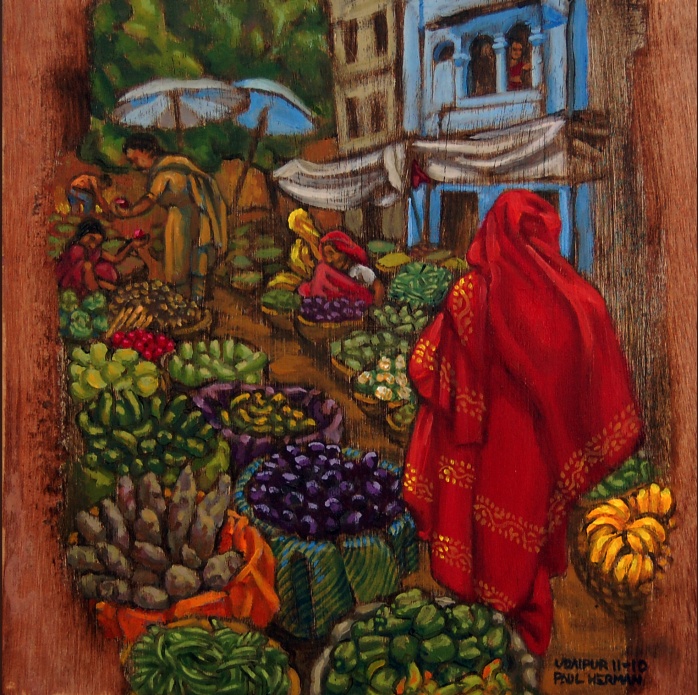
Udaipur market, a small painting I did with the worst quality oils I have ever seen & kerosene for lack of turpentine. On teak-wood board 12 x 12 inches (30 x 30 cm)
Travelling by ship is the only transport enjoyable in itself but after the customarily tedious series of flights & stop-overs I was not too tired to notice the nostalgia that washed over me in the taxi from Chhatrapati airport after a 20+ year absence. As the first day of interaction with Indians wore on I noticed my head & hand gesticulations falling in with local usage, from the Spanish to those of the sub-continent: the Gandhi head wag, neither yes or no but a simple assurance all is well without changes; the palm to the sky on crooked elbow, thumb splayed for: what to do? The slight movement of the head on its neck toward the left shoulder while shutting the eyes momentarily, for: sorry, I can't, or won't, or don't want what is offered.
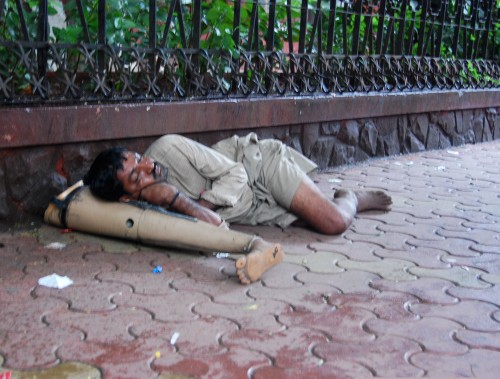 Like
all great cities Bombay, or as it was renamed in 1995: Mumbai, is a
river, constantly moving yet always the same. Its streets are thick
with the intense smells from the foul stenches of life, death &
putrefaction, to the delicate sweetnesses of perfume, spice &
incense. The very smells of humans & of humanity so perfectly
sanitized, deodorized, & cosmetisized in the west, that we are
offended if a person's aromatic presence is anything but
neutralized or perfumed. But where in Thailand the slightest whiff of
body or sewage
brings ready handkerchiefs to delicate nostrils accompanied by
disgusted expressions, here there is an unspoken conspiracy to
valiantly ignore all assaults & people in spotless white
khurtas
will step gingerly over rivulets of raw waste that pour into open
drains as if stepping over spring water in a flowery field. For the
character of India is naught if not accepting & tolerant. It
shrugs
off personal wants to make room for life's vast array of needs
&
variety of abilities.
Like
all great cities Bombay, or as it was renamed in 1995: Mumbai, is a
river, constantly moving yet always the same. Its streets are thick
with the intense smells from the foul stenches of life, death &
putrefaction, to the delicate sweetnesses of perfume, spice &
incense. The very smells of humans & of humanity so perfectly
sanitized, deodorized, & cosmetisized in the west, that we are
offended if a person's aromatic presence is anything but
neutralized or perfumed. But where in Thailand the slightest whiff of
body or sewage
brings ready handkerchiefs to delicate nostrils accompanied by
disgusted expressions, here there is an unspoken conspiracy to
valiantly ignore all assaults & people in spotless white
khurtas
will step gingerly over rivulets of raw waste that pour into open
drains as if stepping over spring water in a flowery field. For the
character of India is naught if not accepting & tolerant. It
shrugs
off personal wants to make room for life's vast array of needs
&
variety of abilities.
The fusion is as unmistakably 'Bombay' as is the mix of brilliant, lacklustre & all the contrasting colours on the grey backdrop of the unpainted & decrepit. The garishness is almost garrulous against the dirt—the way white panes make the dense hues show more saturated in a leaded glass window. And yet, among the crumbling high-rises, the great tapestry of cheap costume jewellery become real gems in shoddy settings.
Among the falling concrete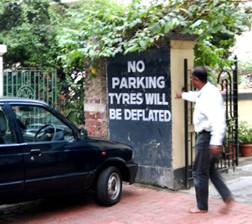 boxes of the 1960's & 70's are others ruined by lack of
maintenance
or worse, by reform. There peeks a twelfth century stone pillar, a
time-softened flagstone floor or an elegant arch leading to an alley
between two atrocities. There are also grand buildings thrown
up during the Raj by Victorian architects gone mad with unlimited
labour. And sprawling corrugated tin & cardboard & plastic-sheet tenements sticking
limpet-like
to ancient temples & new five-star hotels alike.
boxes of the 1960's & 70's are others ruined by lack of
maintenance
or worse, by reform. There peeks a twelfth century stone pillar, a
time-softened flagstone floor or an elegant arch leading to an alley
between two atrocities. There are also grand buildings thrown
up during the Raj by Victorian architects gone mad with unlimited
labour. And sprawling corrugated tin & cardboard & plastic-sheet tenements sticking
limpet-like
to ancient temples & new five-star hotels alike.
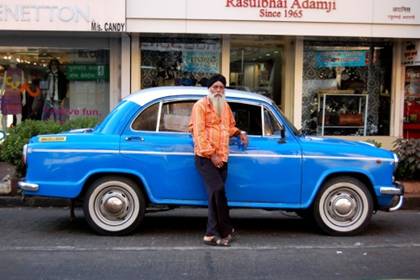 The rich, the poor, the hopeless & the
safe cohabit.
Skinny dogs
& homeless people lie where they find space enough &
while they
sleep in the midst of the whirling turmoil they can feel moderately
sure the 'homeful', with beds & kitchens & roofs, will step over, rather than on, their tails or feet.
The rich, the poor, the hopeless & the
safe cohabit.
Skinny dogs
& homeless people lie where they find space enough &
while they
sleep in the midst of the whirling turmoil they can feel moderately
sure the 'homeful', with beds & kitchens & roofs, will step over, rather than on, their tails or feet.
Rampant poverty is in evidence everywhere. The many village people without marketable skills who immigrate into Bombay's false promise, are everywhere living on its streets & washing in its puddles. And yet though they live in misery they are not miserable. Amid Bombay's ill-lit streets mothers watch their children play, too poor even for the small, square, paper kites richer kids duel with from adjacent rooftops, they play instead with a plastic bag on a string, joyful among the cars on filthy pavements.
Stray thought:
When we were children we all wanted to be adult. We saw the privileges of free choice without grasping the sense of responsibility that accompanies it & so we often pretended to be older than our years.
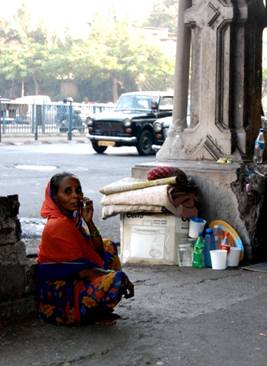 The pretending
might draw amusement, derision or praise as our
elders saw through the farce but from each we learned, until one day,
our acting won us what we sought: a person fooled into thinking we were
indeed adults instead of children.
The pretending
might draw amusement, derision or praise as our
elders saw through the farce but from each we learned, until one day,
our acting won us what we sought: a person fooled into thinking we were
indeed adults instead of children.
After a time this reaction became so common we came to expect it & eventually: to believe it ourselves. But in fact, in our hearts, we are never more than little boys & girls lost to our own illusion.
Goa
The two charming ferries with wooden cabins & white-gloved stewards that brought me to Goa on my first trips are gone. I came by train.
I stopped here in Christian India, the small province 600k south of Bombay first settled by the Portuguese early in the 16th C, to stay with an old friend, Lisa, (the daughter of an even older friend).
Lisa is about my age & has spent most of her life in
Goa where
she now has 21 rooms & a restaurant famous for its good food,
home-grown lettuce (a luxury in India) & home-made buffalo
mozzarella. She is of Italian-American descent & has
restauranting
& 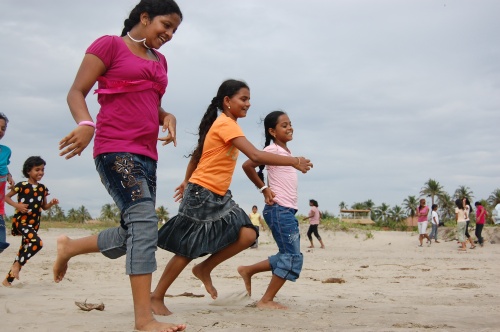 hospitality
in her blood. She runs her staff of 20+ hard though I can see they both
respect & love her.
hospitality
in her blood. She runs her staff of 20+ hard though I can see they both
respect & love her.
She has seen Goa evolve from lawless hippie idyll to Club Med mundanity where the best beach bar, the centre of social interest, plays trance music though there is no Ecstasy to make it enjoyable & has less 'ambiente' than any hole-in-the-wall you can find in any fishing village in Spain where one, at least, needn't haggle the price of a beer down to its actual value.
Today I woke to the shouts of the Nepali staff. I wasn't ready to get up but did never-the-less & dove directly into the shower. As usual I had trouble getting the water to come out the shower head instead of the faucet below but luckily the tap is high up & I am not very tall, so I showered under it instead. Once wet, lathered & shampooed I again crouched under the faucet to rinse but just as I did the flow of water abruptly stopped. I rinsed as best I could with half a bottle of drinking water. I swallowed my toothpaste before coming out to the handsome patio to order coffee with which to rinse my mouth.
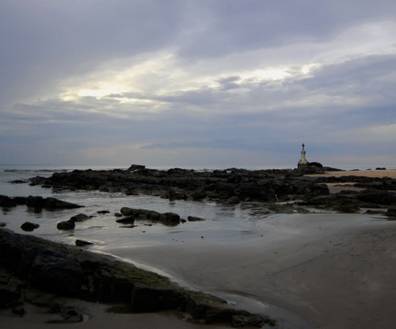 When
I complained I had once again, for the third day in a row, had trouble
with the shower Lisa explained they had found a dead animal in the
water deposit (the shouts) & had finally turned the water off
to
drain, clean & refill it. I asked incredulously: Dead animal?
Lisa
said: "Yes, it stunk to high heaven, it's a good thing you didn't
shower in it". I guess I had been too sleepy to notice the smell of
rotting corpse in the water I had washed in while it lasted.
When
I complained I had once again, for the third day in a row, had trouble
with the shower Lisa explained they had found a dead animal in the
water deposit (the shouts) & had finally turned the water off
to
drain, clean & refill it. I asked incredulously: Dead animal?
Lisa
said: "Yes, it stunk to high heaven, it's a good thing you didn't
shower in it". I guess I had been too sleepy to notice the smell of
rotting corpse in the water I had washed in while it lasted.
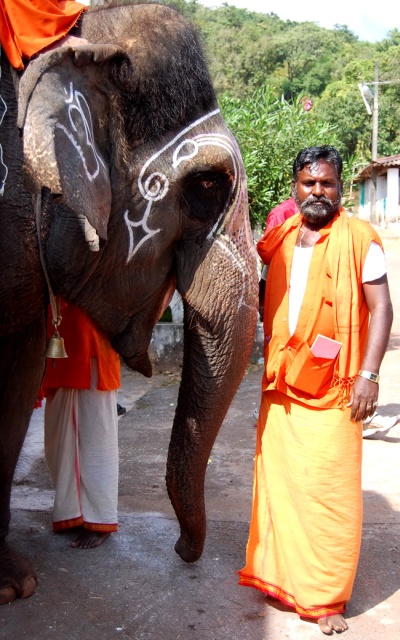 The
first time I came to Goa was 31 years ago, just a 17 year old kid
thrown accidentally into the world. The last time was 23 years ago when
already the inevitable changes had begun to show. The infrastructure
had always been lacking, there had never been a steady flow of
electricity or water or a space entirely safe from snakes, scorpions,
biting ants or spiders as large as mammals. But the first time I lived
in this small enclave of pristine beaches backed by impenetrable jungle
it was not only youth that made the inconveniences palatable but
attitude.
The
first time I came to Goa was 31 years ago, just a 17 year old kid
thrown accidentally into the world. The last time was 23 years ago when
already the inevitable changes had begun to show. The infrastructure
had always been lacking, there had never been a steady flow of
electricity or water or a space entirely safe from snakes, scorpions,
biting ants or spiders as large as mammals. But the first time I lived
in this small enclave of pristine beaches backed by impenetrable jungle
it was not only youth that made the inconveniences palatable but
attitude.
We made a small utopic community, neither created nor designed but united by the happenstance of place, youth, money (in a poor local economy of sparsely populated fishing villages) many of us were hash traffickers living the rest of the year in Amsterdam & reunited here during the relatively cool months post-monsoon for an ongoing party among our kind, one needn't know the other to assume like-mindedness. Who else, after all, would go there?
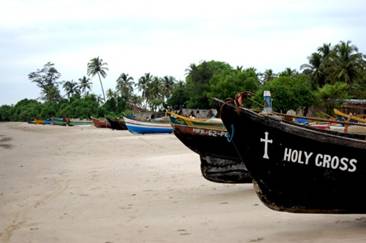 We
lived under the sun naked & did what we fancied under the
confused
& marvelled gaze of the locals from whom we rented houses
&
were served. It took no more than one person telling another: "Party
tonight at Bagha beach, spread the word" for hundreds &
sometimes,
thousands, to gather 'round fires & candles in jam jars—all
automatically friends even if we had never laid eyes on each other or
even, if we came from warring countries. Making music with Western
guitars & Indian tablas, small, skin-covered drums, &
buying
hash cakes or acid from those who walked the moonlit beach shouting
their wares carried in baskets over their arms.
We
lived under the sun naked & did what we fancied under the
confused
& marvelled gaze of the locals from whom we rented houses
&
were served. It took no more than one person telling another: "Party
tonight at Bagha beach, spread the word" for hundreds &
sometimes,
thousands, to gather 'round fires & candles in jam jars—all
automatically friends even if we had never laid eyes on each other or
even, if we came from warring countries. Making music with Western
guitars & Indian tablas, small, skin-covered drums, &
buying
hash cakes or acid from those who walked the moonlit beach shouting
their wares carried in baskets over their arms.
Indeed, we made such an interesting zoo that by my later visits organised tours of prudish & sexually repressed Indians began arriving just to look at us. Sometimes one or another of them would remove his sandals to bathe, but never swim, waist-high in the Indian ocean, fully clothed in bell-bottom polyester or saree.
Things have changed, Goa's innocence has gone the way of its European visitors. Now there is as much law enforcement, albeit corrupt & bribable, as anywhere in India. The same drug dealers still come but are now grey, balding, cynical & bloated with money. And the atmosphere is the same as any place that relies on tourism.
The Indians, just 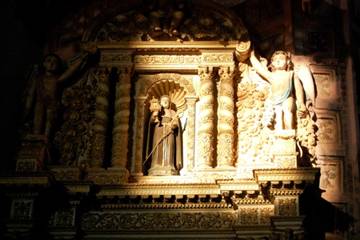 like
us, the same ones willing to put up with a shoddy infrastructure that
offered at least, an alternative to the rat-race, a freedom to love,
laugh & get stoned as a way of life, have organised, become
more
demanding & instead of the marvel, amusement or surprise one
used
like
us, the same ones willing to put up with a shoddy infrastructure that
offered at least, an alternative to the rat-race, a freedom to love,
laugh & get stoned as a way of life, have organised, become
more
demanding & instead of the marvel, amusement or surprise one
used 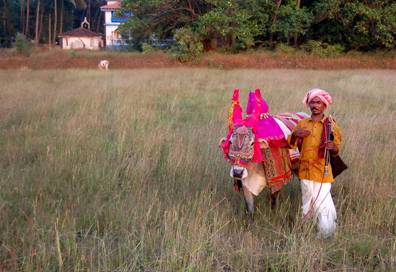 to see
in their eyes only dollar signs remain.
to see
in their eyes only dollar signs remain.
Big investment has built big hotels & rambling guest-houses. There is a Domino's pizza parlour at Anjuna & where people used to arrive on the 'magic bus' out of Amsterdam (which returned stuffed with hash) now lands an aeroplane filled with rude & strong Israeli backpackers looking to live on a few hundred dollars a year, mixed with ordinary working stiffs on their two week holidays.
As a traveller I leaned long ago it is never a good idea to go back not only because of the inevitable disappointment of inevitable change but because the new memories stain the old.
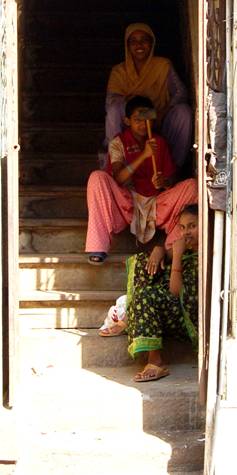 An old friend wrote & when I answered
from India he responded with comments about his own experience here. On
An old friend wrote & when I answered
from India he responded with comments about his own experience here. On
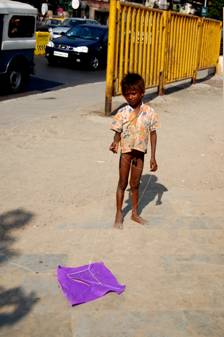 the
one hand he said India made him feel sadness & anger because of
its
multitudes without "hope or prospect"; while on the other he mused: "If
a culture & country could grow as a direct extension &
manifestation of human nature itself, it would result in something very
like India"
the
one hand he said India made him feel sadness & anger because of
its
multitudes without "hope or prospect"; while on the other he mused: "If
a culture & country could grow as a direct extension &
manifestation of human nature itself, it would result in something very
like India"
I have been pondering these thoughts of his & as I sit under the shade of a spreading Acacia surrounded by the sounds of exotic birds & monkeys crashing through its branches I have come to the conclusion that in the first instance we would have to define 'hopes & prospects' within the context of Indian culture, religion & philosophy, to see if they differ significantly from my friend Dick's, Dutch-Calvinist point of view, before deciding if it is indeed what the poor Indian lacks.
To start with it is often the case that feeling sorry for someone is precisely what turns the subject of our pity into a pitiful figure. If I say to an aboriginal living in a jungle or a desert: "Poor thing, you have no electric toaster, air conditioner, antibiotics or chemicals to rid your house of insects" or any of the other things that make me feel I am lucky & he unlucky, I am in effect teaching him he is is disgraced by their lack.
If a poor urban Indian's only hope & prospect is surviving the present moment, achieving it will give him as much satisfaction as say, publishing a book after years of work might be to Dick (who is an (excellent) author). One tourist might not consider his holiday's day full if he hasn't quaffed a bottle of expensive imported champagne at breakfast while another finds satisfaction in getting through the day on a dollar or less. It is always a dangerous pitfall to impose one's own value system on others.
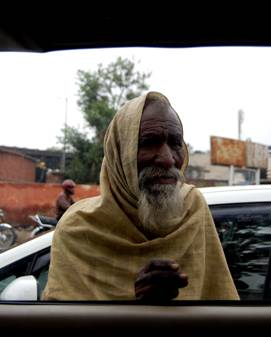 If
there were a pill to induce depression just as there is to alleviate
it, the effect on global culture would be very like television's has
been. As its window blinks open in the world's remotest parts it
provides both mesmerizing delight & tantalizing frustration to
those who look through it to see unreachable worlds. The delight is in
the easy fantasy television's
content provides while the frustration occurs at the vision of a
glamorized ordinary life.
If
there were a pill to induce depression just as there is to alleviate
it, the effect on global culture would be very like television's has
been. As its window blinks open in the world's remotest parts it
provides both mesmerizing delight & tantalizing frustration to
those who look through it to see unreachable worlds. The delight is in
the easy fantasy television's
content provides while the frustration occurs at the vision of a
glamorized ordinary life.
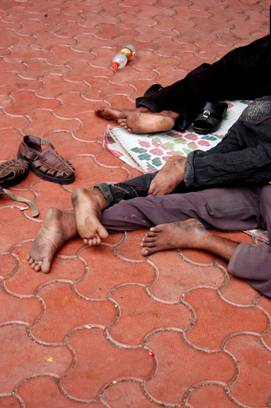
From the shopkeeper in Marrakech's souk to the Bedouin in the Gobi desert, handsome actors in two thousand dollar suits are aided by expert cosmeticians & lighting teams to convince him that any ordinary, often American, life, is far better than his own & that unbeknownst to himself he has been all along no more than a pitiful figure without hope or prospect.
India especially should be exempt from the burden of our pity, common respect is received with far greater felicity. Merely remembering someone's difficult-to-the-western-ear name can have more weight with the name's owner than a coin in his palm.
When one makes acquaintances with Bombay's street people, as I have, one finds he partakes of the same emotional range, the same unattained desires, delights & disappointments as most.
Hinduism embraces acceptance, it invented the second chance, betterment in the next life as reward for living out Dharma correctly in this.
As to the observation Dick made that India is, in a sense, a macrocosm of human nature, as a symbolic metaphor rather than a literal one it gives food for thought because just as we as individuals are none of us of one type or another, but rather all of us are all of the possibilities but in different measure, India's great circus of paradox has a unified character.
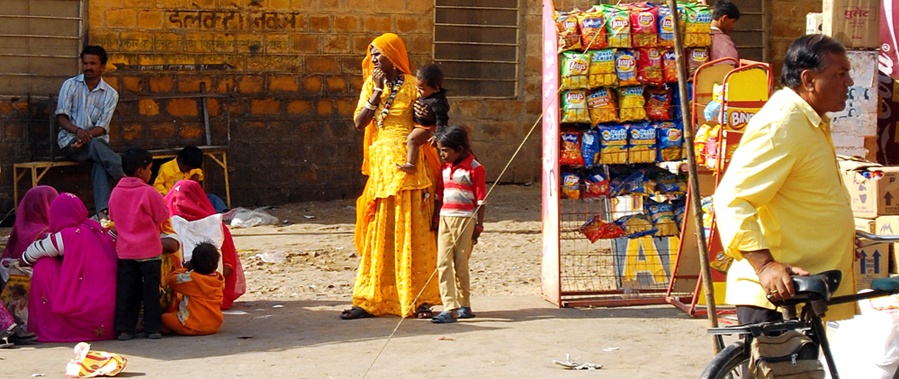
Despite its slight, if harsh policing, India is hugely under-governed. Its practical laws are pragmatically enforced by a lack of privacy. The thief, the wife-beater, the social parasite in whatever form is seen. A community so dense in members controls itself because the extreme proximity of its individuals (it is not unusual for an Indian's territory to be reduced to the actual volume of his body) means there is a witness for nearly all deeds.
On a crowded train those who don't fit or simply haven't the money for a seat or litter will sleep on the floor & those who have paid won't feel put out by the fact they must lift their feet or avoid getting up at night so as not to step on anyone. The Indian often lives within such a small kinesphere he might not feel his space invaded until you actually sit on his lap.
But instead of all agreeing to an unwritten law that, living so closely, each should try to be circumspect with the next, for instance: trying to be quiet while others sleep, as a Confucian oriental might, or as driver, instead of waiting his turn he will all merge whenever he can even if it means he whose turn it is must wait (likely resulting in the same drive-time as being polite), the same goes for smells or light that bother others. They choose tolerance over consideration, forbearance over cooperation.
Bollywood
It is a significant irony in itself that the fellow who stopped me in the Colaba market (Bombay) did so standing in front of the McDonald's, albeit a McDonald's where if you ask: Where's the beef? You'll find their really is none; because he was looking for westerners to act as extras in a Bollywood film, I, of course, agreed at once.
The following day at five in the afternoon a motley crowd of non Indians gathered in front of the same McDonald's & about an hour later were on a bus for the two hour ride from Bombay to the Bollywood studios. Among the thirty or so recruits of all adult ages were Africans from Nigeria & Ethiopia, various European countries, the Americas, China & Japan, & even some Aussies & Kiwis.
On both days, that of the recruitment & that of the filming, we were warned repeatedly not to bring things of value & not to let our possessions out of sight.
Upon arrival we were taken directly to wardrobe, men & women were separated & we were outfitted with either suits meant to look like 1920's England, or waiter outfits, black trousers & waistcoats, bow ties & white shirts, & strangely: black cowboy hats. We changed together right there on the spot under the full moon & were then told to dump all of our valuable possessions in a pile in an unguarded room far from the set.
 The
set was impressive with a two story pseudo-grecian façade
maybe
100 metres long replete with life size sculptures in niches & a
large balcony from which the heroine looks down on her lover as he
walks through the tables scattered across the perfect lawn peopled by
us foreigners. It was meant to be London in 1922 but the women were
dressed as inappropriately as the men in a cross between Scarlet O'hara
& gay 90's impressionist opulence.
The
set was impressive with a two story pseudo-grecian façade
maybe
100 metres long replete with life size sculptures in niches & a
large balcony from which the heroine looks down on her lover as he
walks through the tables scattered across the perfect lawn peopled by
us foreigners. It was meant to be London in 1922 but the women were
dressed as inappropriately as the men in a cross between Scarlet O'hara
& gay 90's impressionist opulence.
Apparently the film, 'Veer', was already in post-production & we were there only to shoot a few missing or failed scenes. It was a Salman Khan film, an actor with godly status here in India. He commands more than a million dollars per picture (a bona-fide fortune in this economy) & is releasing three this same month. Known as Bollywood's bad boy he is still, at 45, Indian audiences' favourite romantic lead as well as a media darling with his image not only all over the press but also on billboards, advertising, television & posters wherever you look.
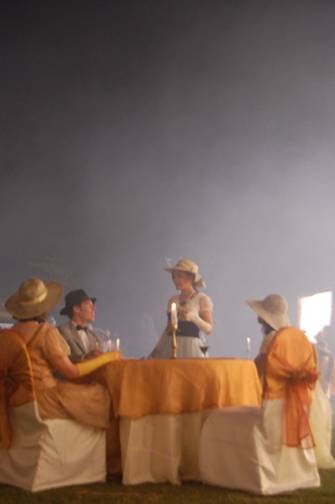 I
have worked on many sets usually in the art department (in what seems
another life-time) but have never seen or even imagined a film of any sort
could be shot so sloppily, much less one likely to see box office
receipts of over 50 million dollars. Bollywood fans are as faithful as
they are undiscriminating.
I
have worked on many sets usually in the art department (in what seems
another life-time) but have never seen or even imagined a film of any sort
could be shot so sloppily, much less one likely to see box office
receipts of over 50 million dollars. Bollywood fans are as faithful as
they are undiscriminating.
The director was a disembodied voice in the sky, booming through huge speakers spread in the trees, which sometimes called: "action! cut! back to your places!" & sometimes either shouted other things instead or nothing at all; the fact not all of us understood his improvisations & either stood our ground through the action or failed to return to our places for the next take didn't seem to bother anyone at all. I, the humble extra dressed as waiter, seemed the only one of the hundreds on set that cared a fig for such details as continuity.
And then: a hush fell on the multitude & the great man himself walked on set. Khan followed by two gym-giants dressed in black & three others who fussed with his hair, his face & his immaculate clothes. I pulled out my camera but one of the men in black rushed over to inform me that photographing Mr Kahn was not allowed (I got one shot anyway, below in white suit silhouetted against the lights).
He limited the display of his acting talents to a muscly swaggering before the camera & a lowering of his chin to look fulminatingly, if expressionlessly, into the lens.
I had directions for a route through the tables, talk to the guests at the first, serve drinks from my tray at the second & stop at the third where I was captivated by a winking green-eyed Irish woman whose lightning wit thrilled. We talked through several takes & she told me she was on sabbatical from her job as Sony's marketing director in Ireland.
When we commented on Khan's apparent lack of acting skills I said: "well, he has an impressive body for a man his age, it must take a lot of hours at the gym" she answered: "Furthermore he seems preternaturally clean, indeed, he appears to be a positively sterile object among the all-too-human" I countered: "Yes, I'm sure he doesn't pick his nose." without missing a beat she answered: "no, I'm sure he has someone who does that for him".
After a few takes the director descended from the sky
& incorporated right before me, a fifty year  old
man with long receding hair, to speak to me about an idea so brilliant
he could barely describe it through his giggles: as the great star
walked past me to his love on the terrace above, he is so engrossed in
her beauty (& not without reason—pictured left) he bumps into me without even
noticing.
old
man with long receding hair, to speak to me about an idea so brilliant
he could barely describe it through his giggles: as the great star
walked past me to his love on the terrace above, he is so engrossed in
her beauty (& not without reason—pictured left) he bumps into me without even
noticing.
He told me expressly to turn away from the table to my right in order to set up the accidental collision. Although this made little sense since it put Khan within my line of vision before the jostle, I took the direction without comment.
The first take went like a charm, Louise, the Irish girl, encouraged me in my big starring break with winks & even the suggestion we improv: "when he bumps into you" she said "turn with a good right cross to his jaw, when he falls I'll kick him in the groin. Don't worry Paul I've got your back"
And on she went in the same vein blinking her big pale eyes & making her boyfriend nervous enough to come running over between shots. And so, under the banks of lights, the camera boom on rails fixed on us & within the steady gaze of the hushed crew, Louise made easy bon mots & I cracked up, delighted as always by a woman with a sense of humour, as if we were all alone.
I told Louise that since I couldn't see Salman's approach she should give me the nod when he was close. It was then, however, the director came back with an even more brilliant idea, smiling & smirking at his own ingenuity he said: "instead of a nudge why don't you go ahead & fall to the ground?" & he directed the three women at Louise's table to laugh when I did.
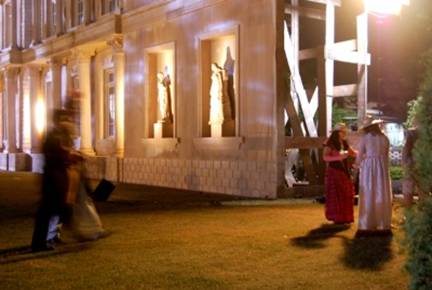 When
he added as afterthought: "say, I'm sorry sir" as if flustered by the
faux pas of being knocked to the ground by one of the guests, I
became the only extra with a spoken line & what's more, in
tight
frame with India's most celebrated actor.
When
he added as afterthought: "say, I'm sorry sir" as if flustered by the
faux pas of being knocked to the ground by one of the guests, I
became the only extra with a spoken line & what's more, in
tight
frame with India's most celebrated actor.
Again, despite the awkward choreography, it came off without a hitch, I kept my head down so that I might credibly appear not to notice his approach & allowed myself to be knocked over. On that first take, which I was sure was a keeper, Salman offered me his hand to get back to my feet, for the rest he left me where I lie.
The director came running up again actually laughing at the sophisticated wit of the scene but told me: "No, no, you must fall more" &, rubbing his hands, added: "do you know Charlie Chaplin?" At which Louise & I burst into another fit of uncontrolled laughter.
But we did at least another dozen takes without ever again coinciding. Louise would give me the nod but he repeatedly sabotaged the timing by doing things like stopping a single pace away from me & we would end up looking at each other, I bemused, he: on the verge of a starry tantrum at having to work with such incompetents but afraid to move his face, endlessly fussed over by the make-up people, for fear it might crack.
A couple of more attempts & the director came back, this time I got him to hear my suggestion I turn to the left instead of the right & he looked at me as if I were daft: "yes, of course, turn to your left"...
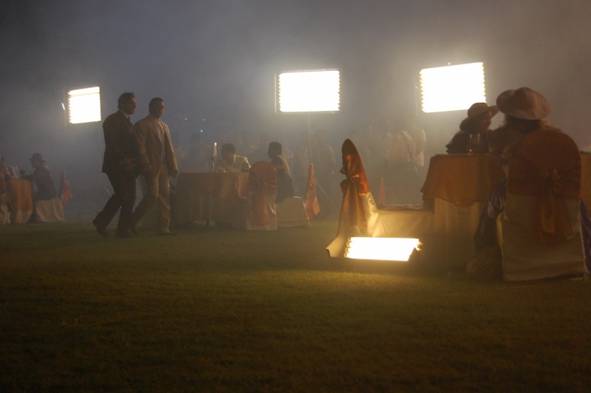 But
still we didn't coincide. One of the director's many minions came up
once & asking my name said: "when it is time to turn I'll shout
'Paul'" to which I readily agreed. I was beginning to feel a little
nervous as the unwavering stare of the crew & actors clearly
blamed
me instead of their country's greatest artist. But not only did I never
hear my name shouted (on that take I stood my ground, waiting, as Salman
walked past) but I never saw the minion again.
But
still we didn't coincide. One of the director's many minions came up
once & asking my name said: "when it is time to turn I'll shout
'Paul'" to which I readily agreed. I was beginning to feel a little
nervous as the unwavering stare of the crew & actors clearly
blamed
me instead of their country's greatest artist. But not only did I never
hear my name shouted (on that take I stood my ground, waiting, as Salman
walked past) but I never saw the minion again.
On another try Khan actually spoke, & what's more, to me, fixing his big black eyes on mine he said, not without lordly benevolence: "can you hear me when I make this noise?" & he made a rough sound in his throat which he could do without moving his face. I assented & he said: "I will make that noise when it is time for you to turn toward me." I stood & waited, when he made the noise I turned only to find him still three metres away...
Without any explanation offered, or which I can imagine, there were shouts & the entire set went into motion, the extensive lighting, its diffusers & reflectors, the rails & camera that ran on them, the all-important smoke machines & lackeys all rotated like a creaky giant & half an hour later we filmed my getting up from the ground after my fall, Salman a pace past me, at an entirely different angle from the table the women sat at & with completely different lighting.
The shoot went on until sun-up & I met a few interesting people including a very engaging old man, an architecture buff who, like me, is a great Frank Lloyd Wright fan & from Buffalo where I worked at Wright's Darwin D. Martin house when at university; & a pretty Chinese girl that writes for a lady's magazine who agreed to go out with me the following day.
In short: I had a ball as well as an interesting experience. I was paid 500 Rupees for the night's work, about 10 bucks, but though they asked me back I declined thinking once was an experience, twice was just badly paid work.
I look forward to seeing it, Veer, when it comes out.
The welcome
As I walked up to a relatively expensive restaurant in Bombay a mother, father & their seven or eight year old boy opened the door before I reached it & walked out. The boy separated from his parents & veered off toward me. His family were momentarily disconcerted even making a micro-movement as if to pull him back but he had already reached me. Looking up into my eyes with a beaming smile he offered me his hand & said: welcome to India.
His Mum & Dad broke into laughter & I returned his handshake, his smile & thanked him with the same sincerity as the welcome he offered.
Chor bazaar, Bombay
I remember the Chor bazaar as a sprawling flea market filled with junk, antiques & interesting things like mountain healers who cured lesions with poultices made of live iguana blood; odd items left behind by the pre-independence Raj like old books & Victrola record players.
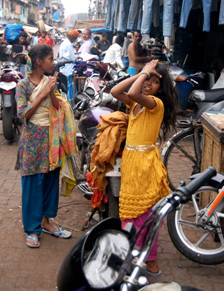
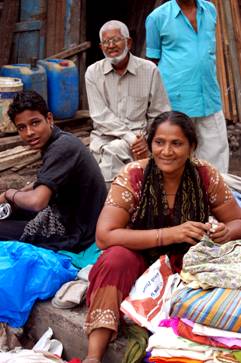 Today I found it
deteriorated into the most pathetic market I
have
ever seen, untouchables selling items I can't imagine anyone picking up
off the ground for free much less paying for. In this lowest of
commerce conducted by the abjectly poor I again thought of Dick's pity
for just this sort of Indian's hopeless lack of prospects. None of the
sellers expected me, a foreigner (i.e. rich) to buy the wares he spread
on old potato sacks on the ground amid rivulets of raw sewage, but
delighted instead at the rareness of my presence as representative of
my privileged class. I ate exquisite delicacies prepared at the
most rudimentary of stalls & wrapped in newspaper.
Today I found it
deteriorated into the most pathetic market I
have
ever seen, untouchables selling items I can't imagine anyone picking up
off the ground for free much less paying for. In this lowest of
commerce conducted by the abjectly poor I again thought of Dick's pity
for just this sort of Indian's hopeless lack of prospects. None of the
sellers expected me, a foreigner (i.e. rich) to buy the wares he spread
on old potato sacks on the ground amid rivulets of raw sewage, but
delighted instead at the rareness of my presence as representative of
my privileged class. I ate exquisite delicacies prepared at the
most rudimentary of stalls & wrapped in newspaper.
I found that as symbol of riches & power beyond not
only their
prospects but even their wildest imagination, they did not see, for
instance, my camera as the equivalent of a year's labour—something to
angrily resent as desirable yet out of their reach—but rather as an
object of fun which they innocently asked to share in, posing with
broad smiles at the experience, though they would never see the photos.
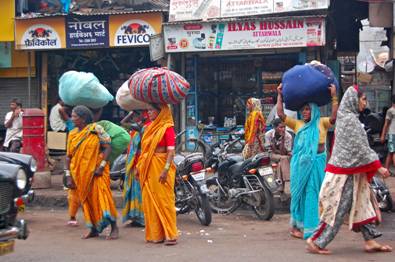 Where I might wish
for & even suffer for the impossibility of
attaining Bill Gates' wealth, Brad Pitt's beauty or Mick Jagger's fame,
their absence of superfluous ambition actually puts happiness within
easier reach for them than I.
Where I might wish
for & even suffer for the impossibility of
attaining Bill Gates' wealth, Brad Pitt's beauty or Mick Jagger's fame,
their absence of superfluous ambition actually puts happiness within
easier reach for them than I.
Jaipur
Jaipur is a beautiful city. The first planned city in all of India, the Maharaja Sawai Jai Singh II and the Bengali Guru Vidyadhar followed the instructions of the Vastu Shastra written 10,000 years ago by Mamuni Mayan (translates roughly to 'the science of architecture' often consulted in the construction of temples but never before in a city) for both intelligent practical usage & mystical congruence. The eastern gate of the fortifying wall is called 'Suraj pol' or sun gate & the western: Chand pol (moon gate), its streets & boulevards are measured in multiples of nine for the planets.
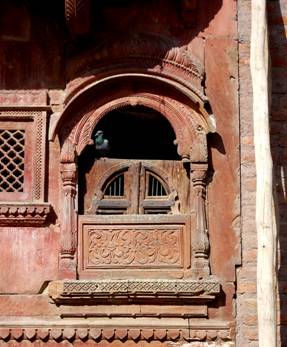 It
is known as the pink city because what is not built of rose sandstone
is washed with red clay & walls throughout are decorated in a
cream
pattern, below.
It
is known as the pink city because what is not built of rose sandstone
is washed with red clay & walls throughout are decorated in a
cream
pattern, below.
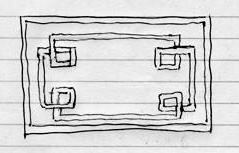 It
has a long tradition of marble sculpting, usually Hindu gods. It is
India's third largest city & is a city of contrasts but in a
different way to Bombay. Here the sprawling & spreading urban
ugliness of cheap concrete boxes in which the modern India shelters,
contradicts an opulent, even extravagant history of building by
fabulously wealthy Rajput Maharajas, while Bombay's greatest splendours
were left behind by the British Empire in a fusion of styles known as
Indo-Saracen.
It
has a long tradition of marble sculpting, usually Hindu gods. It is
India's third largest city & is a city of contrasts but in a
different way to Bombay. Here the sprawling & spreading urban
ugliness of cheap concrete boxes in which the modern India shelters,
contradicts an opulent, even extravagant history of building by
fabulously wealthy Rajput Maharajas, while Bombay's greatest splendours
were left behind by the British Empire in a fusion of styles known as
Indo-Saracen.
Yesterday I walked with a friend under a steady drizzle refusing the persistent rickshaws that drew close to offer their services. Despite the discomfort of the unusual weather we enjoyed the time walking gives to see the details, make eye contact, have a broken-English conversation or try some hitherto unknown delicacy from one small & dingy shop or another.
Before entering the walls of the old city we ran across another meatless McDonald's (an expensive night out for the average Indian family) complete with a plastic, life-sized statue of Ronald himself sat on a bench, arm extended along the back, inane smile under clown's make-up.
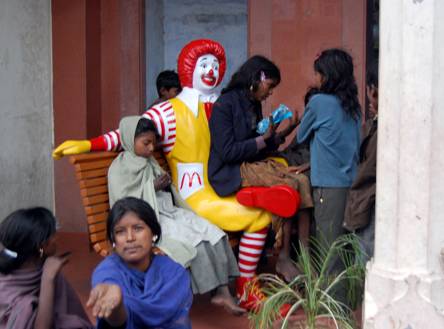 This
sparkling-clean Ronald McDonald, however, was covered in dirty,
dirt-poor urchins & it struck me as the very image of clueless
American Imperialist expansionism. I managed to snap a few photos
before the street children noticed & ruined the photo-op with
self-consciousness.
This
sparkling-clean Ronald McDonald, however, was covered in dirty,
dirt-poor urchins & it struck me as the very image of clueless
American Imperialist expansionism. I managed to snap a few photos
before the street children noticed & ruined the photo-op with
self-consciousness.
When they did they jumped up as one to beg for money. Once surrounded I put my camera in its bag & reached into my pocket for money but pulled out a larger wad than I had intended & the circle closed uncomfortably around me.
I looked at the girls ranging from around five to eighteen years old & peeled a relatively large bill from the rest & they were already grasping. I made a gesture that it was to be shared before handing it to the eldest.
As soon as I did they attacked like the Spanish gypsies used to do in Sevilla before tourism's value became understood & the Guardia Civil taught them not to with heavy billy clubs. They pressed against me, their small hands all over me even reaching into my pockets. With the camera in one hand & the money in the other the best I could manage at first was simply holding them both too high for the girls to reach.
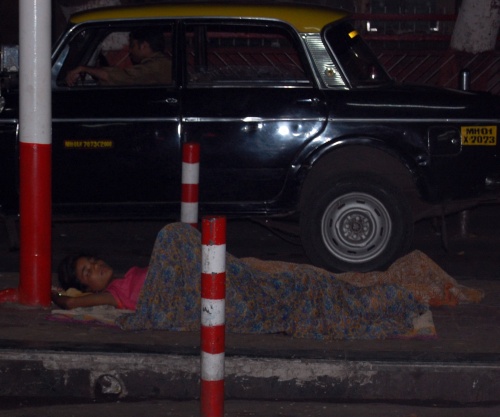 I
made brusque & threatening gesture that made them retreat
slightly
& momentarily while filling the vacuum on the opposite side. In
a
moment, more joined their ranks & I was afraid I would have to
resort to violence to extricate myself before being overwhelmed. I was,
never-the-less, aware what a rare opportunity this made for a dramatic
series of photographs & so shouted to my friend who stood like
a
deer caught in headlights, "Are you getting this?"
I
made brusque & threatening gesture that made them retreat
slightly
& momentarily while filling the vacuum on the opposite side. In
a
moment, more joined their ranks & I was afraid I would have to
resort to violence to extricate myself before being overwhelmed. I was,
never-the-less, aware what a rare opportunity this made for a dramatic
series of photographs & so shouted to my friend who stood like
a
deer caught in headlights, "Are you getting this?"
Finally I chose the biggest for a sharp open-palmed shove to the chest which sent her flying to land heavily on her behind. She made no sound & though it must have hurt she got up again without hesitation to immediately rejoin the fray. They insisted; cringing with closed eyes at my movements without attempting to evade them. They were obviously willing to take a blow in exchange of a coin, a meal, a chance at another day's survival.
With an abrupt & graceless movement I finally broke through the circle & with my friend (whose camera had, unfortunately, seized-up during the melee) moved briskly into the crowded street where it would be difficult for them to surround me. And yet one little girl, about seven & dressed in rags, with an ugly scar that crossed from brow to cheek with a pure white eyeball in its middle, followed us for about a kilometre. I would have liked to give her a few coins but had learned my lesson: this was too desperate a neighbourhood to risk generosity. I can only hope the eldest bought samosas all 'round with the bill I gave her.
Indian saying: A Man is unfinished until he marries... & then he is finished.
The antiques dealer, Saturday 14th of November
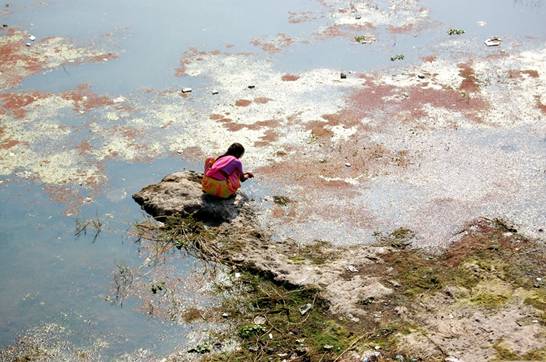 I
stopped in an antiques shop yesterday to look at Mughal miniatures to
add to my small collection though one can no longer buy the
antique ones as I used to do in my long ago visits. I spent an hour or
so looking at what the shop owner had, using his thick glasses as
magnifying lens to judge their quality.
I
stopped in an antiques shop yesterday to look at Mughal miniatures to
add to my small collection though one can no longer buy the
antique ones as I used to do in my long ago visits. I spent an hour or
so looking at what the shop owner had, using his thick glasses as
magnifying lens to judge their quality.
He had some wonderful pieces from the south in the Orissa style, wildly exuberant & lively but the prices were high & I don't know them well enough to confidently negotiate the right one.
When I finished looking, without buying anything, the counter was covered in small paintings & under them: a packet of cigarettes with my brass Zippo, my old friend, inside. I had noticed how fascinating Indians found the lighter which they don't have here & it had been difficult to find fuel for it. Out of sight I forgot about it & walked out leaving it behind after thanking him for his time. By the time I realised, I was already across town & by the time I got back he was closed.
After breakfast this morning I tried again. The owner greeted
me
with the kind of anticipatory hopefulness a returning client inspires. 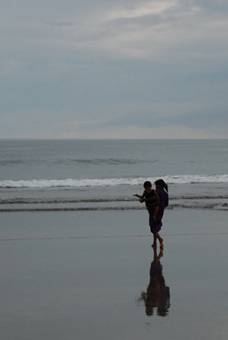 His
assistants ran around turning all the lights on (they are kept off to
save on electricity between clients). I had still said nothing but I
could see it wasn't promising. Still I hoped he might just be trying
his luck & would return the lighter when asked. But when he casually
picked up a silver trinket from the counter-top, the only object not
under glass, & had an assistant remove it, I knew I was in for
a
fight.
His
assistants ran around turning all the lights on (they are kept off to
save on electricity between clients). I had still said nothing but I
could see it wasn't promising. Still I hoped he might just be trying
his luck & would return the lighter when asked. But when he casually
picked up a silver trinket from the counter-top, the only object not
under glass, & had an assistant remove it, I knew I was in for
a
fight.
When he finally faced me across the glass counter under which I could see the piles of paintings I had looked at yesterday, I explained I had forgotten a box of Marlboros with a lighter in it & had come back to pick it up. At first he pretended not to understand, when I repeated he spoke briefly to his scared-looking staff in Hindi before turning back to me & assuring me it wasn't there. Had I perhaps left them somewhere else? "No" I insisted, "there is no question: I left them here". He looked cursorily on the floor behind the counter, shrugged his shoulders & repeated: "They are not here." "They were when I left yesterday" to which he countered: "we don't smoke, why would we want to keep your lighter?" "Because it is valuable" I answered.
He then flew into a sudden fit of anger, informing me they were not thieves, my accusations offended him & he even jabbed his finger very near my chest as he looked down on me fiercely from his greater height through his thick glasses (he was Kashmiri). His assistants were quiet & nervous & in all fairness, there was still room for doubt one of them had taken it unbeknownst to the owner.
I stayed calm & said simply: "it was here when I left
yesterday,
if it is not here now it is because someone here took it away. He tried
another gambit: "If another customer came in after you & took
it,
there is nothing I can do about that". I restricted my response to a
not-worth-answering smirk. He again became vehement saying: "Do you
want me to call the police?" to which I answered evenly: "yes, please"
though I wasn't entirely convinced India's entirely corrupt guardians
of justice wouldn't simply take advantage of the conflict to get a
bribe before letting me leave.
 But
I needn't have wondered as he answered my affirmative with an
arm-waving, theatrical, menace: "Why should I call the police?"
"Because you just offered". He shouted a bit more & I simply
said:
"I'll be back" hoping I sounded like Shwarzenager.
But
I needn't have wondered as he answered my affirmative with an
arm-waving, theatrical, menace: "Why should I call the police?"
"Because you just offered". He shouted a bit more & I simply
said:
"I'll be back" hoping I sounded like Shwarzenager.
Once outside however, I doubted there was anything further I could do. There was no evidence but my word for an accusation of theft & nothing the police could do even if they were my greatest champions. Anything might have happened to the lighter & unless it was found on the premises, the only part of my story they were sure to believe was that I had lost it. Still, I left convinced he lied, sure he had removed the little silver jug from the counter-top when I entered for fear that in an altercation I might grab it & run out the door with it.
As a visitor, a guest in India, I felt more saddened than angry. It wasn't after all, the first Zippo I'd lost.
When my driver came to pick me up this afternoon I told him the story. He laughed easily & assured me I shouldn't worry, he would get my lighter back. I couldn't imagine how, if the shop owner now admitted having it he also admitted his intention of stealing it & he must know as well as I that I have no legal recourse nor am I, a tourist, likely to take it up in gangster style. When we arrived at the shop my driver, Om, told me to wait in the car.
After about ten minutes he came out to ask me in. The antiquarian & his staff of three stood in a huddle in the middle of the shop & seemed a little disconcerted though Om was calm & smiling.
The owner blustered: "you can search my shop all you want!" To which I replied: "But I find it easy to believe it is not here".
At this he turned to the boy, the youngest of his employees at
about
sixteen & more likely an indentured servant from the north than
a
salaried employee; he was of low caste & poorly dressed
& when
the shopkeeper spoke to him in Urdu, with angry inflection, the boy  looked
bewildered, scared & non-plussed. He then turned back to me
&
said in English: I just found out it was him, I am so sorry, I am
ashamed that such a thing could happen in my shop, we are honest
people. God gave me much money & I don't need to..." &
interrupting himself he turned again with even greater anger toward the
boy with raised arm as if to strike him. Before he could actually slap
him though, I spoke up saying it was alright & asking where the
lighter was now.
looked
bewildered, scared & non-plussed. He then turned back to me
&
said in English: I just found out it was him, I am so sorry, I am
ashamed that such a thing could happen in my shop, we are honest
people. God gave me much money & I don't need to..." &
interrupting himself he turned again with even greater anger toward the
boy with raised arm as if to strike him. Before he could actually slap
him though, I spoke up saying it was alright & asking where the
lighter was now.
He spoke to the boy & though I couldn't understand him, the effort the boy made to understand his boss was clear for all to see. Finally, hesitatingly, he reached under the counter, eye still on his boss as if to check he was doing it right, & he pulled a folder stuffed with papers from under the counter. When he loosed the string that held the papers in a bundle I saw the packet of Marlboros & retrieved it. Inside was the lighter &, mysteriously, only one cigarette which was not a Marlboro.
The tall Kashmiri declared to me: "I want you to take him to the police!" I answered with an Indian head-wag & said it was okay. He offered me his big hand but I ignored it reaching to offer my own to the boy instead before leaving without more ado. I never learned how Om changed his mind about keeping it.
Pushkar
Pushkar is one of India's most sacred places as Lord Brahma was born here. In Sanskrit 'push' means flower & 'kar': hand. They are joined to name this town because when Brahma died & rose to heaven, Shiva reached through the sky to drop a flower on the spot his mortal body fell. And on that place one of India's most important temples has stood nearly 1000 years. It is a vegetarian town where no animal is killed.
Upon arrival I was bullied more than conducted by my guide to the ghats where I was handed ceremonial coconuts & a priest attempted to tie a blessed string around my wrist & paint a prayer bindi on my forehead in exchange of money. Although I am accustomed to showing ritual respect in all the sacred places I visit, this felt all wrong & I refused. Having broken the assembly line of tourists bustled here directly from their vehicles, made the priests aggressively angry.
I had dinner with Miani, a young man born & raised in Pushkar, his passion moved me. His grandfather had been head priest in Pushkar's largest temple, carrying on old wisdom under British rule. Miani had instead grown with the example of idealistic young hippies who followed Lennon, Leary & Baba Ram Das to spiritual illumination in the magical East still only recently indepedent of British rule.
As we ate & then rolled joints of his excellent charras he talked to me about his point of view, the one garnered under the combined influence of ancient cultural & religious roots, & enthusiastic discovery from the stream of starry-eyed foreigners who talked with him, laughed with him, slept with him.
He said he remembered how when he was young the holy men still had power which one could feel in their touch. Now the same temple his grandfather had run, the one I could see over his shoulder & under a setting sun as we spoke, put someone at the door to charge an entrance fee to tourists like me, tourists interested in history,
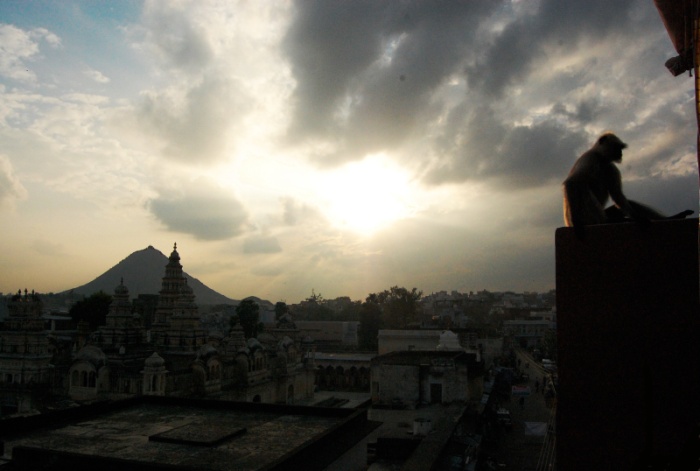
art & architecture, not the spiritual purpose of the building. They let people carry their shoes (for fear they might be stolen at the door) a lack of respect equivalent to wearing them, & they no longer minded if a woman defiled the temple with her menstrual cycle as long as she paid for her ticket.
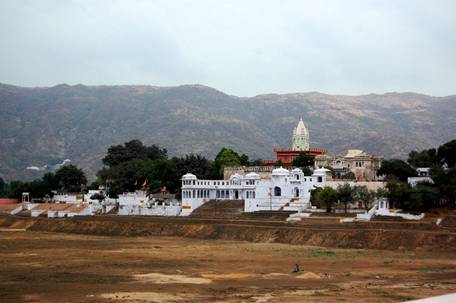 Miani
went on to say the fourth age, the age of darkness his grandfather
predicted, had begun. In the first age there were only the gods, the
second began with their creation of the world. The third was when the
wise men, the enlightened, the holy men, roamed the earth to guide
& set example for confused mortals. The fourth is when the
demons
man created survive him, & the final abandonment by the gods.
Miani
went on to say the fourth age, the age of darkness his grandfather
predicted, had begun. In the first age there were only the gods, the
second began with their creation of the world. The third was when the
wise men, the enlightened, the holy men, roamed the earth to guide
& set example for confused mortals. The fourth is when the
demons
man created survive him, & the final abandonment by the gods.
He asked: "Haven't you noticed how our mother earth has again become
our enemy as in days of old when the tiger was mightier than man
&
the rivers stronger than man's ability to control them?"
Pushkar's lake was traditionally believed to be bottomless until the
Mughal Emperor, Jehangir, who like his father embraced all religions
but hated superstition, had it measured & determined it was
nowhere
deeper than twelve cubits. When I arrived it was empty & the
wide
range of water birds that swooped over & under its surface were
displaced. As he talked I could see across the sprawl of ugly concrete
on whose rooftops monkeys cavorted & children played with their
small, square kites, the big muddy hole surrounded by forlorn temples
on whose steps morning ablutions were undertaken as long as history in
the sanctified waters; & now only cows, monkeys, pigs &
mangy
dogs foraged amid its rubbish.
The lake had become a toxic hole disgusting with the waste of its streaming pilgrims & growing population & Miani told me how the government had decided to first kill the fish, presumably to be able to collect them all instead of their lying all over the bed of the waterless lake.
Six million fish, six million, he emphasised & his voice trembled when he told me how the whole town stunk of their death before they were gathered in nets & shovelled onto overflowing trucks to be carted off. A shock to a town that hasn't seen an animal killed, nor even an egg eaten, in a millenium.
Pushkar has gone from dozens of centuries as unspoilt spiritual mecca coloured in its every facet by religious ritual through a rapid evolution as subject for Victorian watercolorists & engravers pandering to isle-bound vicarious adventurers, to object of digital images taken by a steady procession of clueless tourists whose only purpose is to impress friends back home (in the real world) with their exotic experience when in fact they might have gone to Italy instead if only the exchange on the dollar wesn't so damned low.
Jain
 Some
of India's most beautiful temples are not Hindu but Jain, one of the
world's oldest religions. Its most recent jinna or 'conqueror
Some
of India's most beautiful temples are not Hindu but Jain, one of the
world's oldest religions. Its most recent jinna or 'conqueror  of the inner self' was Mahavira born 550 BC, the twenty-fourth ascetic
master often portrayed standing with the vines that grew around his
legs as he meditated, oblivious to all, the world, his hunger, his need
of sleep. In one temple I asked the priest why one of its murals
portrayed Mahavira in the lotus position with a man holding a stick
that traversed his head, in one ear & out the other. He
explained
it was a story of the man who was offended when Mahavira didn't return
his salutation, at first he shouted, but to no avail. It was only when
Mahavira continued meditating quietly even after the man had run the
stick straight through his head that he realised Mahavira was truly of the
enlightened.
of the inner self' was Mahavira born 550 BC, the twenty-fourth ascetic
master often portrayed standing with the vines that grew around his
legs as he meditated, oblivious to all, the world, his hunger, his need
of sleep. In one temple I asked the priest why one of its murals
portrayed Mahavira in the lotus position with a man holding a stick
that traversed his head, in one ear & out the other. He
explained
it was a story of the man who was offended when Mahavira didn't return
his salutation, at first he shouted, but to no avail. It was only when
Mahavira continued meditating quietly even after the man had run the
stick straight through his head that he realised Mahavira was truly of the
enlightened.
The Jain do not believe in any God but rather in five cosmic principles
based on doing no harm to any living thing, & the perfect
structure
of the universe which they want to spiritually join, without making any
change which, since the universe is perfect, could only make it less good.
There are fewer than 5 million Jain in the world, mostly in the south of India where the devout walk the world sky-clad (i.e. naked). They carry brooms with which they sweep the path they will trod clear of any small animal they might otherwise accidentally hurt with their footfall. Their religion's precepts have influenced India's culture in a measure far larger than the proportional number of devout.
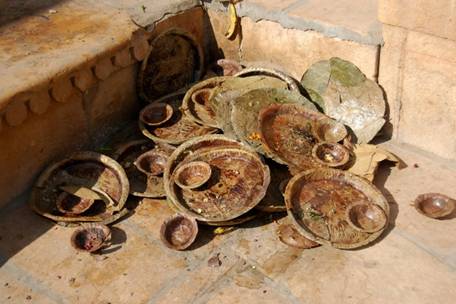 Right:
plates on which food from market stalls is served. They are pressed of
green leaves that retain their shape once dry.
Right:
plates on which food from market stalls is served. They are pressed of
green leaves that retain their shape once dry. 
When finished eating from them they are thrown wherever one happens to be standing & within a short while they degrade into individual leaves again.
Jodhpur
Between here & the Eastern frontier roam India's national symbol, the peacock, looking impossibly decorative against the dry, yellow-grey desert backdrop & at night, they wail like babies in distress.
Although cows are sacred here they are used for labour & milk. Ghee, cow-milk butter made less perishable by being clarified & reduced, is used in place of oil. The cows that roam free may have once been domestic livestock but liberated by a farmer in thanks' of a good crop, a son's wedding or other celebration of good fortune. Or it might be born its own master; domesticated yet wild, living in an urban centre just as wild animals live in the jungle, mountain or desert. Whether it crosses a busy highway or mills among city traffic & pedestrians, it looks neither left or right, showing little interest in anything, moving in slow motion as the world whizzes around it.
I saw one temple that was built 8 hundred years ago with ghee to mix the mortar because the drought meant they had no water.
Today, however, I saw something I didn't know still existed: running in the desert a genuinely wild cow, a cow of the breed that has never been domesticated. They are called Neel Ghai here & are blue-grey, taller than their city cousins, stronger through the front quarters & as fast as big deer.
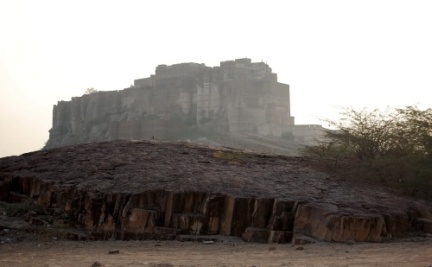 A
friend & I walked up the hill to Jodhpur's incredible &
apparently impregnable fort (rising like a rock in the image at left)
when a neatly combed little boy of about 9,
dressed in the short pants of a school uniform with his books in a
satchel asked me for the pen with which I write this. But since he
didn't look like he needed it & it was the only one I had, I
didn't
give it to him. He then told me he saves coins from foreign countries,
did I have any from my country to give him? A ploy I had already heard
enough times to know that though a bank won't change coins to local
currency there is a trade in them which must involve the collection
& transport of large quantities back to their home countries. I
carried on walking & didn't notice that he also approached my
friend who lagged a few steps behind. My friend didn't look closely,
assumed he was a beggar instead of the middle-class boy of high caste
that he was, & gave him a hand-out. My friend walked past him but
when I turned I could see the boy holding the coin aloft between thumb
& forefinger, a smile of wonder & pride on his face, to show it
off to the elders of the neighbourhood, who all, in turn, smiled
proudly back at him. I have been saddened to see India's
evolution
from being a country with a high percentage of poor people reduced to
begging, to becoming a country of beggars.
A
friend & I walked up the hill to Jodhpur's incredible &
apparently impregnable fort (rising like a rock in the image at left)
when a neatly combed little boy of about 9,
dressed in the short pants of a school uniform with his books in a
satchel asked me for the pen with which I write this. But since he
didn't look like he needed it & it was the only one I had, I
didn't
give it to him. He then told me he saves coins from foreign countries,
did I have any from my country to give him? A ploy I had already heard
enough times to know that though a bank won't change coins to local
currency there is a trade in them which must involve the collection
& transport of large quantities back to their home countries. I
carried on walking & didn't notice that he also approached my
friend who lagged a few steps behind. My friend didn't look closely,
assumed he was a beggar instead of the middle-class boy of high caste
that he was, & gave him a hand-out. My friend walked past him but
when I turned I could see the boy holding the coin aloft between thumb
& forefinger, a smile of wonder & pride on his face, to show it
off to the elders of the neighbourhood, who all, in turn, smiled
proudly back at him. I have been saddened to see India's
evolution
from being a country with a high percentage of poor people reduced to
begging, to becoming a country of beggars.
In Bombay I had been surprised by the number of young mothers (very young) often with a breast uncovered & a baby, always asleep, who asked for a handout but refused offers of money. They insisted instead, I go with them to a pharmacy to buy baby formula. If I refused to go to the shop with them, why refuse my money? It turns out they are involved in a huge Oliver Twist style organised racket where young women are imported from poor villages in Rajasthan & given babies doped with opium to carry around. They are watched over to make sure they have no earnings they might hide for themselves outside of the monies divided between corrupt pharmacies, the bosses, & lastly, the basic subsistence expenses of keeping the girls in a place they can sleep & eat together as their only recompense.
As I became more & more aware that India's developing tourism includes a subdivision of burgeoning beggary both professional & amateur, I bemoaned the effect new income is having on old, proud, Indian culture.
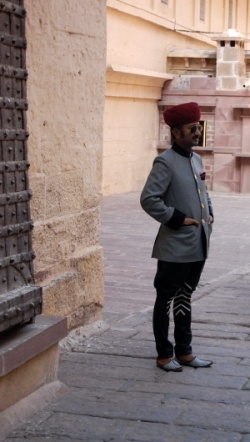 By
the time I got to Jaiselmer after following an admittedly foolish
touristic route through colourful Rajasthan, I found myself faced with
a uniformed guard, the same one who had checked my ticket for paid
entry into a Jain temple, asking me for money for "watching my shoes"
while I was inside. I was finally outraged. We were surrounded by
people in the small square before the temple doors & I spoke
loudly: "Shame on you! I have left my shoes at the entrance of a
hundred temples & mosques all over the world but here in your
town
I must pay to insure they are not stolen? This is a holy place
&
you are not a poor man, you are among those lucky enough to have paid
work but you are willing to give up your dignity for a few coins? And
in Rajasthani: harijan nai? (harijan is the word introduced by Gandhiji
to replace the more offensive 'untouchable', it means 'children of
God'.) i.e. the gist of my meaning was: are you an untouchable without
more recourse than begging for your food?
By
the time I got to Jaiselmer after following an admittedly foolish
touristic route through colourful Rajasthan, I found myself faced with
a uniformed guard, the same one who had checked my ticket for paid
entry into a Jain temple, asking me for money for "watching my shoes"
while I was inside. I was finally outraged. We were surrounded by
people in the small square before the temple doors & I spoke
loudly: "Shame on you! I have left my shoes at the entrance of a
hundred temples & mosques all over the world but here in your
town
I must pay to insure they are not stolen? This is a holy place
&
you are not a poor man, you are among those lucky enough to have paid
work but you are willing to give up your dignity for a few coins? And
in Rajasthani: harijan nai? (harijan is the word introduced by Gandhiji
to replace the more offensive 'untouchable', it means 'children of
God'.) i.e. the gist of my meaning was: are you an untouchable without
more recourse than begging for your food?
He shrunk back, palms facing me & said: "up to you, up to you..." but I insisted: "I know it is up to me, I don't need your permission", & once more I repeated: "Shame on you"
I was gratified to notice that the Indians all around, both local & tourists looked on seriously & some even showed assent with nodding heads.
Where I have found the same open-hearted, generous, friendly hospitality & sense of 'humanness' (often lacking for instance in an exquisitely polite interaction in Thailand) that has always been typical of India, everywhere I go now, in the touristic hot-spots it seems we tourists have taught them that, more than humans carrying wallets, we are wallets incidentally accompanied by humans.
Not only are they now willing to charge for entry to a place of worship (just as we do in Europe) but there are guides with memorised patter, though generally incapable of answering any but the most superficial questions, who kickback to priests who follow them around to make sure they don't lie about their earnings & who will themselves also bully shamelessly for 'donations to the temple'.
Worst of all in a country with a deep historical respect for personal spirituality, the search for wisdom or enlightenment, are the saddhus who renounce the material to practice instead a combination of ascetics & meditation in order to overcome samsara (the wheel of suffering pictured on India's flag) & the illusion of reality or, conversely, reality's illusion—to search for higher universal truths. Now they don the orange robes & sit before temples of any denomination selling the rights to photograph them to sightseers (see photo at the top of this page). They watch television instead of meditating & wear prosperous paunches instead of practicing ascetics.
Indeed, some have taken the begging bowl to full commercial exploitation where gifts meant to improve the giver's karma are collected wholesale & the teacher, the saddhu, the seeker of higher planes of consciousness, is driven around in BMWs followed by armed guards as he amasses his earthly fortune.
We tourists, if not the travellers, have corrupted with easy earthly pleasures; what is a small expense, like a good hotel room, to a member of a first-world working class, can be the equivalent of a month's honest work in the third world. And an honest, artless price paid for a closer look at a culture amounts instead in its purchase & removal.
I remember a girlfriend in the south of Spain in the years before the European Union & a single European currency were introduced. She made a comment about not liking the idea & I was surprised. "Why don't you want a union formed? It will bring Spain a lot of money & everybody who lives here will be better off." She answered: "Why would money make us better off? We have always been poor & we have a right to be poor. They will give us money but take our culture." A scant couple of decades later I can see for myself that she was right. The Andalucia closer to its six-centuries old Moorish past then the twentieth century, is, today in the twenty-first, filled instead with people stressed & anxious to live the American dream, even as they fall short.
Spain went from just above Greece (traditionally the poorest) to just below France. A house in the south of Spain now costs as much as one in Tuscany & many cashed in on the windfall, giving up the ancestral home built of stone to be able to buy large television screens for their new concrete condos. And now that they all know what a BMW looks like they are no longer happy with a Renault; in which way are they better off? Rampant tourism has shown Spain which parts of her culture have value by paying for them—thus turning them from culture to performance, & the Spaniard has become an American wanna-be while contradictorily despising American culture.
I remember the open, lazy Andalucia made up of far flung villages some of which could only be reached by donkey, villages nearly self-sufficent & proud of old traditions—I miss it. The Spanish hat & cape has gone the way of India's turban & long moustache. Spending more money each year of life is the sum of the American dream, relishing acquisitive power more than the things in themselves; even a poor uneducated Indian goes deeper than that, let us not pity him, we should respect him instead.
There have been psychological studies that show the lottery winner & the man converted to paraplegic, each reach a range of emotions equivalent to that they had before the accident, happy or otherwise, within a year. Should we go up to the person in a wheelchair, pat him on the head from our greater height & tell him: "poor thing, you can't walk anymore, I feel for you"? So why do we condescend to the Indian so? The man sleeping in the street, resting his head on his own orthopaedic leg—at the top of this page, is known for his jolly personality.
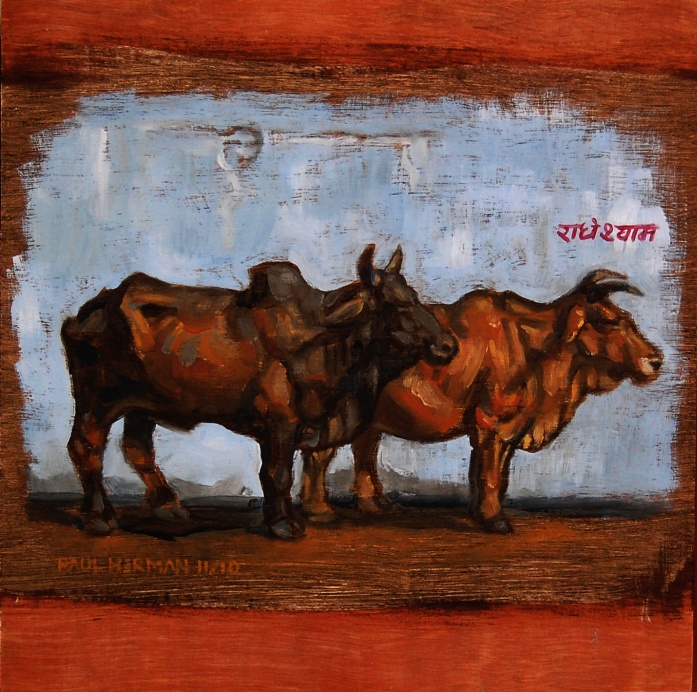
Do Ghai, Indian (Brahma) cows, oils on wood panel 12 x 12 inches (30 x 30 cm)
I spent the day & night with Vivendra, an Indian artist I was introduced to. He & his family have been living in his rambling house & spacious studios for 21 years. He sows crops, at this time of year: mustard, on his few hectares. Around them are many more hectares which hold a shallow lake & fields used for harvest, sparely scattered with country houses & the odd building.
Like the Renaissance engravings of Florence that fascinated me so as a child, the trees & palms receded infinitely on a desert as flat as a puddle of water all the way to its horizons.
Vivendra is from Jaipur, one of four large cities in the strip of desert called Rajasthan that ends in the 200 kilometres of sand dunes that reach from behind the 12th century city of Jaiselmer to the borders of Pakistan in the north. He has become involved with the local community. He organised, for instance, the rebuilding of the dung school house into a far less charming but much more functional concrete building where around 140 kids, from 6 to 12, from the farms & surrounding villages get educated.
He encourages the area's rich crafts tradition—at only an hour's drive from Jaipur still too remote to find commercial outlet—while at the same time worrying about the cultural impact commercial success brings. After begging the government these last 11 years he has been allotted fifteen hectares nearby his home (about 40 acres) where he intends to set up workshops for local artisans as well as a marketing & distribution infrastructure.
Vivendra's house seemed to me a locus of creativity & his studios were littered with work by other artists, students & craftspeople, sometimes even in collaboration.
From his immense rooftop terrace my eye was drawn by the only hillock on the flat plain that surrounded us. Its ragged stone peak was surmounted by an interesting looking ruin with an intact cupola. I asked Vivendra: "Temple?" & he answered "500 years old"
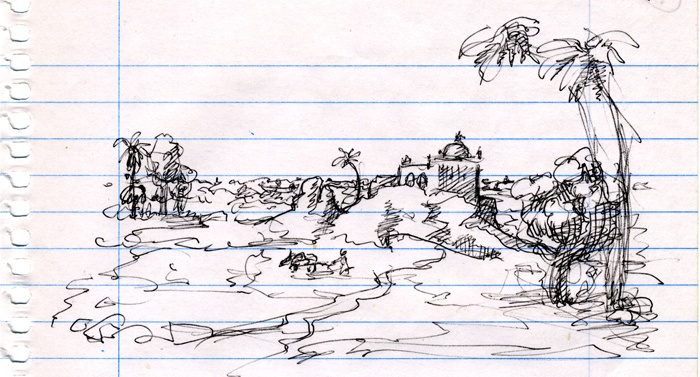
It was a fifteen minute walk through fields of yellow mustard, past a goatherd & skirting the shallow lake before we reached the ruined temple. As it turned out the stones that capped the hill were grey granite as was the temple. It had beautiful if naïf granite columns with lotus motifs on capital & shaft that supported delicate arches through which, it seemed, one could see to infinity.
There were still about 150 square metres of temple standing
covered,
including the dome over the old altar, approximately 4 metres in
diameter. Another 250 square metres of walls whose roofs had caved-in
& probably the same again in foundations with varying levels of
crumbling stone walls.  Some of
the pillars of the fallen arches had already been carted off to be used
in local homes.
Some of
the pillars of the fallen arches had already been carted off to be used
in local homes.
Without roof it will not last many more monsoons.
Looking at it I was moved by the thought that though it has seen twenty generations of men born & die it will probably revert to a pile of the stone it was made of within my life-time, indistinguishable from the rest lying all around. And it occurred to me that with labour prices such as they are here as little as $20,000 could just about get the place restored, or at least: secured & roofed.
I spoke to Vivendra about it & he told me it could not be purchased because it is not owned; it belongs to the community at large but contractual rights to its use could be secured & he felt the grateful community would surely support such a scheme with enthusiasm.
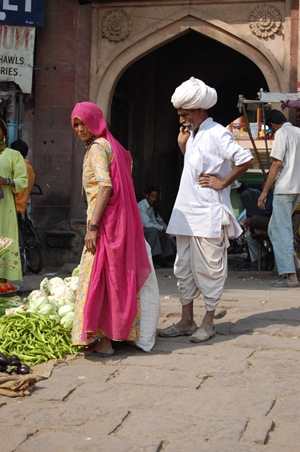 I
suggested an artists colony. A few motivated artists with a couple
thousand bucks each could get the project started. Further funds could
be solicited from people like gallery owners or arts magazines who
could advertise their involvement in a project to save a historical
building destined to be put at the disposal of creative endeavour.
I
suggested an artists colony. A few motivated artists with a couple
thousand bucks each could get the project started. Further funds could
be solicited from people like gallery owners or arts magazines who
could advertise their involvement in a project to save a historical
building destined to be put at the disposal of creative endeavour.
The original altar could be returned to its use as place of worship while the rest could provide at least a dozen spacious & unique studios a few looking out in one direction or another from the height of the hill with a beautiful communal courtyard. A community of interested artists or university students could be rallied & organized using no more than social networking Sites dedicated to the arts.
A standard tourist Visa to India is six months & the place might attract landscape painters or people painters. Or those who want to learn new techniques & mediums from local artisans or even just to enjoy working in the quiet, beautiful & exotic surroundings.
Vivendra embraced the idea & countered with an offer to produce a documentary about the area, its arts & crafts & the temple building to help promote it. Although upon further contemplation he suddenly asked: "What of the impact a couple of dozen foreigners a year coming & staying would have on this as yet unspoilt area & people?" to which I answered without hesitation: "If we only allow artists, what possible negative impact could they have?" To which he quickly assented with a knowing smile.
A hired chauffer, a taxi or rickshaw driver or guide all have a supplementary income that easily outweighs his pay. They do not need prior arrangement to collect 25 to 35% of anything their clients buy from any shop they take them to & up to 40% with those they do. Kashmiri rug & textile shops reputedly pay the best kickbacks & will even pay a courtesy fee for foreigners who buy nothing.
The hotels they take you to will also pay cash for guests brought to their doors & if you travel with your driver he will also get complementary bed & board.
As often as not the only reason a driver will collect his reasonable fee is to allay the tourist's suspicions as to his true motivations.
It sometimes happens that a single piece will jump out of thousands calling my attention & positively screaming: "You need me! Buy me now!" In this case it was a strip of fine hand-woven wool about a metre & a half long & maybe 60 or 70 cm wide, absolutely useless to me but embroidered in Kashmir with such a delicate pattern of flowers in such fine & subtle colours that my mouth watered & I wanted it to be mine.
If I bought everything beautiful that shouted at me here in India however, I would not only be bankrupt but would need a ship to take it all back. And anyway I had only been taken to this Kashmiri shop by my guide for a commission, I had actually asked him to take me to see rugs from Pijim. I asked the price half-heartedly anyway though I was already sure I wouldn't permit myself its purchase.
He was a big burly, fair skinned fellow who answered without hesitating: 30,000 Rs (about $650). I appraised it at about 6 or maybe even 8000 because it was such a fine piece but its fair price may have been much lower. I thanked him & began to walk out, without bargaining, to see if my guide would take me where I told him on the next attempt. But the fat Kashmiri stopped me with a hurt expression on his face; but tell me your price, he implored.
"Nah, never mind, we can't reach my price from yours" I answered.
Yet he insisted: "name your price, if we can reach agreement we will make each other happy & if we don't we can still be friends".
To which I retorted simply: "2000 Rs."
He looked shocked & disconcerted before answering: "but no... not 2000, that's impossible."
At which I offered my hand & a smile & said: "Then we can be friends!"
He went blank for a split second & then ignored my hand: "No! In that case we must hug!" And he threw himself upon me with a bear's embrace.
The colours of Rajasthan
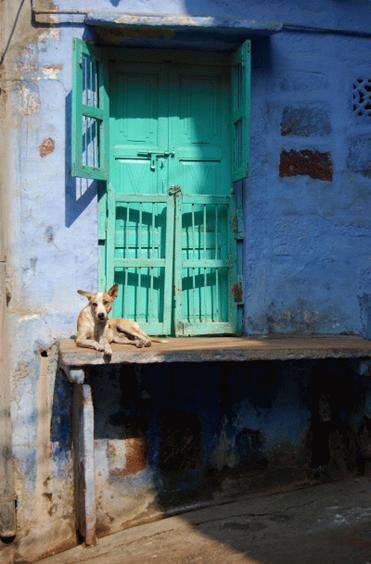 Three
of the major cities of Rajasthan with long intermingled history, though
for much of it they were independent states, are symbolised
romantically by three colours, three animals & the evocation of
three sentiments.
Three
of the major cities of Rajasthan with long intermingled history, though
for much of it they were independent states, are symbolised
romantically by three colours, three animals & the evocation of
three sentiments.
The great old city of Udaipur alone maintained its sovereignty even under the Mughal emperors who ruled from Kabul to the Deccan plains. Everyone from Babur who was the first to consolidate Hindustan, to King George & Winston Churchill have stayed at its famous fairy-tale palace on the lake. Udaipur is painted almost everywhere a pale but saturated Lapis Lazuli blue complemented in places with a turquoise green of the same tone.
It is known as the blue city, its animal is the horse which is the symbol of power.
At the western end of Rajasthan where it collides with the Thaar desert stands Jaiselmer carved of honey-yellow sandstone that glows golden in the evening sun.
It is the golden city whose animal is the camel, the emblem of romantic love.
At the other, eastern, end of Rajasthan is the, historically, absurdly wealthy kingdom of Jaipur known as the rose city not because of its roses or production of rosewater, but because it is built of an iron-red sandstone painted here & there with rust coloured clay.
The rose city's emblem is the elephant which represents good fortune.
In Jaipur working camels, buffalo, horses, donkeys &
even the
odd elephant compete for the roads with cars & motorbikes. It
was
here in the bazaar still housed in buildings that stood before Babur
was born, that I saw a beautiful young Marwari stallion standing among
the vendor's stalls.

He was such a fine specimen that I stopped to look him over. He was of a pure black which would undoubtedly turn to chestnut in his third or fourth year. He was healthy & obviously well-cared for except for his hooves which were shamefully tattered. My curiosity peaked & I wondered why this beautiful horse with ragged feet was tied, saddle-less, in the midst of the Jaipur bazaar, & so I asked.
When I found someone who spoke English well enough he explained that since Indians believe that a horseshoe that shod a black horse brings good fortune (especially for a new-born around whose neck they are hung) people buy them & new ones are nailed on for the next client.
The old city was practically all there was of Jaiselmer (right). When I was here last it rose like a mirage on the surrounding desert & its desert people were unused to foreigners. The entire old town is now turned over to the needs of tourism, its open-eyed residents all turned to sales-people, many even importing items from other parrts of India to sell to tourists. But it was not tourism that ruined this old fortified city, it was the unlikeliest of industries: energy generating wind mills, four thousand of them & all the people who were brought in to install them.
This town was once a kingdom important as gateway to everything that lay beyond. Its brave warriors were famously noble, their sultan might play chess with his enemy on the eve of battle & in one case, the war lost, the men rode their camels at their enemy weaponless, arms outstretched, an act called Johar, death before defeat. Their women committed sati by throwing themselves from the parapets on to their husband's burning funeral pyres.
Jodhpur
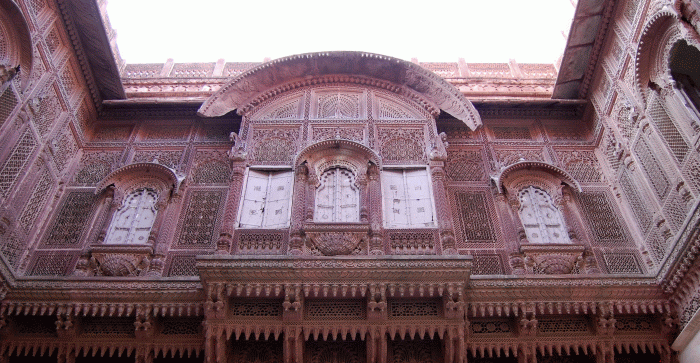
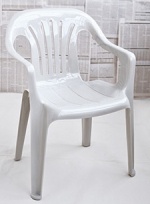 Twentieth
century progress
Twentieth
century progress
As I am sucked as if by quick-sand into India's more remote regions, up here in Himachal Pradesh, at the foothills of the Himalayas, I notice I am not yet lost enough to escape two of the most anti-aesthetic inventions of the twentieth century, the extruded plastic chair which, with its functionality, transportability, stackability & inexpensiveness, has spread virulently to blot otherwise picturesque & unblemished landscapes from remotest desert to highest mountain.
The other is the fluorescent light rod, now turned to long-life bulbs, whose greater number of lumens at lower wattage, & their durability, has meant the charming yellow light of fire & incandescent bulb have been replaced by the thoroughly unflattering blue visibility of history's ugliest century.
Children
There are so many people asking the foreigner for money that he can give frequently but not always nor injudiciously; where, for instance, giving to one might bring a throng of mendicants that surround him & then follow him for several kilometres. Sometimes when they are children I will simply play with them ignoring their pleas for money which, often, they seem to prefer to a hand-out. Here are some of the faces of those I made forget about money for a few minutes-



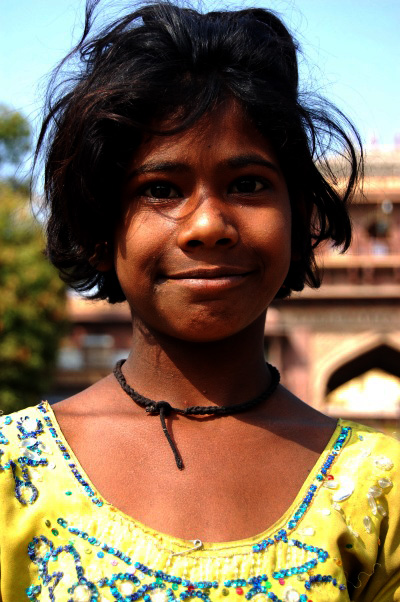
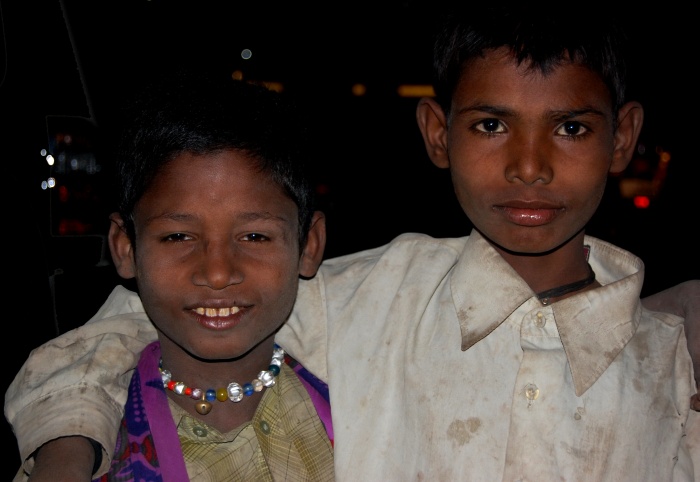
Parvati vallley
At the doors of the world's tallest mountain range, in the appropriately named town of Kulu (centre for production of Pashmina & quality wool shawls & blankets), they dump their waste & excrement directly into the pristine waters of melted snow that run the length of the province as the Beas river.
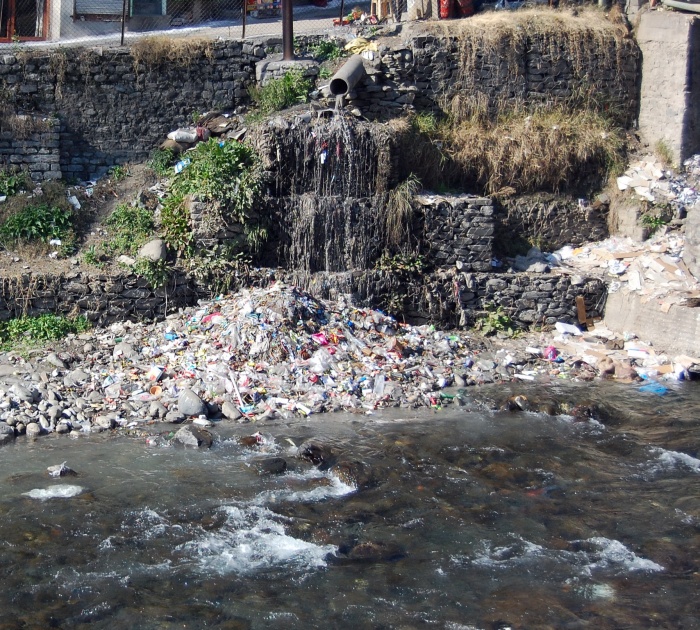
In Himachal Pradesh, here north of Nepal, at the highest tip of India bordering China to the east, the sides of the rickety buses I travel in are covered in the vomit of passengers unused to riding in motorized vehicles.
A brief history interlude
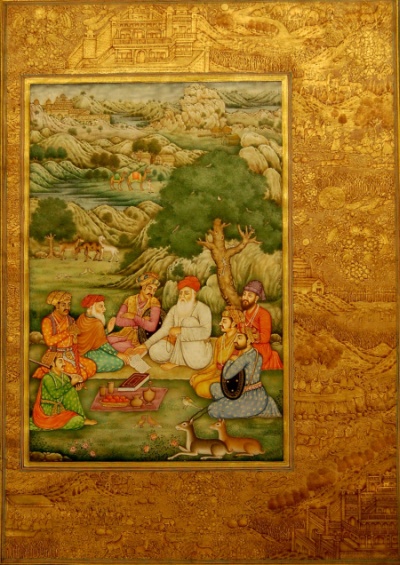 Mongol
horsemen regularly raided extravagantly rich Hindustan for centuries,
usually, like Alexander, daunted into turning back by the Indus river
(now crosses Pakistan from north-east to south-west) after the
difficult crossing of the Afghan mountains through the Khyber pass.
Mongol
horsemen regularly raided extravagantly rich Hindustan for centuries,
usually, like Alexander, daunted into turning back by the Indus river
(now crosses Pakistan from north-east to south-west) after the
difficult crossing of the Afghan mountains through the Khyber pass.
Timur, known because of his limp as Timur-er-lein (the lame), was made famous in England because of the play by Christopher Marlowe, Tamburlaine, in the late sixteenth century. A proud descendant of Genghis Kahn, Timur was the first to lash boats together & run his band of warriors over their bows to cross the Indus & march on the fabulous kingdom of Delhi.
One of the preoccupations that added to the madness of the endeavour, was the quasi-mythical proportions the descriptions of elephants were to Timur's brave but superstition men.
When they arrived, Timur was met outside Delhi's gates by a huge army whose first line was made up of 300 heavily armoured elephants with lances lashed to their tusks &, on their backs, armoured turrets bristling with cross-bowmen. But Timur had prepared a thousand camels & water buffalo with large bundles of dried grass tied around their bodies. They were driven toward the Maharaja's array & at the last moment, set on fire.
The beasts panicked & galloped, flaming, directly at the impassable cohort of elephants who, in turn, also panicked & turned to trample their own army.
Delhi was burned to the ground while Timur celebrated his victory drunkenly in a tent outside the walls—more comfortable under the stars than a roof of his conquered city. During its reconstruction through the 16th century (hence 'New' Delhi) it changed hands many times but though Timur would die without any way of knowing it, he had established a dynasty that combined Persian & Hindu cultures in an Empire founded by his son that stretched from the Deccan plains to Afghanistan in the north,—with Persia & China flanking at the rise & fall of the sun—that would become India's golden age.
Back to our time & the Parvati valley

After
a torturously mind-rattling twenty-one hours in buses that must have
been designed for Jews by the Spanish Inquisition; & then,
apparently, held
together with chewing gum & rubber bands since before the
invention
of the internal combustion engine, I arrived in the remote Parvati
valley just a short distance from Kashmir above & China to the
right. A town called Manikaran was recommended for its natural hot
springs. The tiny town with a river that runs with clean, cold,
Himalayan
waters on the one side & hot sulphurous ones on the other,
sounded
charming. 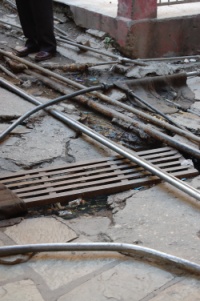
In fact what I found were two beautiful old temples, & a handful of dishevelled-slate roofed houses, smothered in newly built concrete buildings all equipped with hot water from the springs. The streets writhe with scalding hot pipes that each edifice lays where it can without any attempt at organisation or cooperation.
The ground floors are dedicated to shops with cheap, often Chinese, trinkets & synthetic textiles (in an area famous for its fine wool-weaving) marketed to Indian honeymoon couples in cheap shoes as well as the more intrepid small-time hash smuggler who comes to take a kilo or three back home to pay for his trip. The upper floors are all seedy & freezing cold rooms for rent to tourists. Furthermore the town is so far wedged in the cleft of the gorge, between snow-capped mountains that rise nearly sheer to tower above, that it only receives about an hour of direct sunlight a day. The rest of the time one either submerges in the blisteringly hot water or steps out into the cryogenic outdoors. I went to bed early
still hot from the bath with a book
& three
blankets. I woke in the morning still in my hastily purchased long
johns & thermal shirt shivering under my heavy blankets.
I went to bed early
still hot from the bath with a book
& three
blankets. I woke in the morning still in my hastily purchased long
johns & thermal shirt shivering under my heavy blankets.
I did some exercises to warm up before putting on all the clothes I had with me. But I should have saved my energy because when I asked where the path to the nearest town was & how far, I was told the place & that it was at four or five kilometres distance & I thought to make a pleasant pre-lunch excursion of it. But what it didn't occur to me to ask was its distance in altitude &, as it turned out, the entire four or five kilometres seemed to be straight uphill.
Before arriving I had risen 800 metres in altitude & the view of the distant mountains white with un-perishing snows, rose above the others as I did.
Finally, breathless & with aching legs I found hidden in a crag the hamlet of Gaggli, a small group of stone-and-wood dwellings that hide among hills covered in Marijuana plants. At this time of year the families who live here all sit around their fires & press Marijuana pollen between their palms, 10 or 15 grams at a time, to make, arguably, the best hash in the world.
Although mobile 'phones & other weird tourists like me had already come at other times before me, the miniscule village of less than 150 souls, more Mongol than Indian, still carried on a life whose roots are lost in unwritten history.
I am noticing that there has been a discernable &
linear
evolution to this journey from white-gloved service & marble
bathtubs in the luxurious hotels of Bombay to hot showers in Rajasthan
to cold ones further north. Finally, beyond the Punjab & into
the
Himalayan foothills: a bucket & a cold water tap in the toilet.
The
same pattern repeats in the form of transport from aeroplanes to first
class railway  cabins
& hired drivers in new cars, to third class train carriages to
rickety buses to downright dangerous buses to walking & now,
finally, climbing.
cabins
& hired drivers in new cars, to third class train carriages to
rickety buses to downright dangerous buses to walking & now,
finally, climbing.
Now in this tiny community of Gaggli, lost high in an immense mountain
range, I sit on the floor near a small wood stove in a miniature
one-room stone house, with no shower or toilet at all, indeed, the
question of what to do in its absence was never mentioned.
So I have finally escaped the extruded plastic chair (in fact, all
chairs, as they don't have the custom of using them here) & the
fluorescent tube, hoozah! I do rather miss a heated room with a toilet
in it though.
After a meagre meal cooked on the little stove in the middle of the
room comprised of chillies, garlic, chappati & rice I write
this by
the light of a candle & wonder what tomorrow will bring. For
the
moment I relish not only waking to the morrow's sunrise but also tonight's
view
of these spiky crags under the brilliant blue light of a fat
half moon.
 Manikaran
again
Manikaran
again
Back down from Gaggli again in the cold, dismal & joyless hot-spring town in the sharp valley cut by the Beas river. The town whose daily high point is an hour in the boiling hot sulphurous bath before crawling dizzily out into the sunless & wintry air.
I have enjoyed the hard trekking of these last days but other than the hamlet of Gaggli have found nothing to justify the trouble it took to get here. Although I did take the trouble to find the best hole-in-the-wall-greasy-spoon (the only kind there are) to eat. A ramshackle corrugated tin affair painted deepest blue & run by a happy family. Their green gloop & orange liquid with crunchy objects are particularly good, where most of the food in these mountains is plain & bland.
Last night after a long walk with a young friend we went there
for
dinner. Before we arrived we remembered that the only drink he had on
offer was a nauseatingly sweet chai &  so went
to the liquor shack & bought a litre of beer to take back
& have with our meal.
so went
to the liquor shack & bought a litre of beer to take back
& have with our meal.
I asked one of the daughters for glasses, popped the bottle, toasted & sat back to await our food with the ravenous appetite & the happily aching legs our walk had earned us.
Just then, however, we noticed a commotion suddenly gather out the open front of the little restaurant, a crowd led by two brown uniformed police. The first with a captain's hat, the second with a matching brown beret. I didn't look them in the eye when they entered but they walked past the first set of two tables to the last at which my friend & I sat with our glasses of beer & half-empty bottle on the table before us. He addressed me gruffly (& I will write his side of the conversation in intelligible English though it was only barely): "What do you think you're doing here?"
I stood & answered perplexed: "We are waiting for our food, why? What is wrong?"
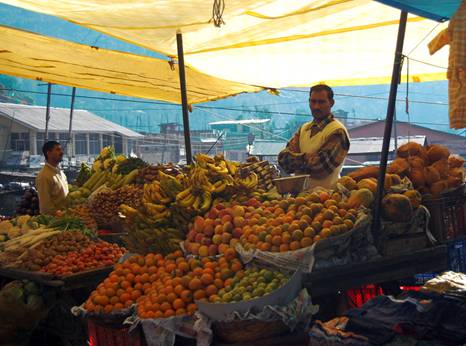 At
that he reached up, grabbed my left ear & squeezed it hard. I
kept
calm knowing that doing anything that might be interpreted as
aggressive would be a fatal mistake—while he could handcuff me
&
use his baton of heavy wood with a brass knob at one end & a
sharp
point at the other, all day long with impunity, if he cared to—I said:
"hey!" genuinely shocked & looking him in the eye I pulled
gently
away. I was careful also to show no fear, to avoid giving him reason to
suspect I had a
reason to feel fear, but at the same time wanted to show I was in
perfect agreement with his own estimation of his authority's power. I
would answer his questions as concisely as I was able & keep
quiet
the rest of the time. I had no idea what he was after but imagined
events leading to a bribe which I was willing to pay, discreetly,
whether there were reason for the shake-down or no.
At
that he reached up, grabbed my left ear & squeezed it hard. I
kept
calm knowing that doing anything that might be interpreted as
aggressive would be a fatal mistake—while he could handcuff me
&
use his baton of heavy wood with a brass knob at one end & a
sharp
point at the other, all day long with impunity, if he cared to—I said:
"hey!" genuinely shocked & looking him in the eye I pulled
gently
away. I was careful also to show no fear, to avoid giving him reason to
suspect I had a
reason to feel fear, but at the same time wanted to show I was in
perfect agreement with his own estimation of his authority's power. I
would answer his questions as concisely as I was able & keep
quiet
the rest of the time. I had no idea what he was after but imagined
events leading to a bribe which I was willing to pay, discreetly,
whether there were reason for the shake-down or no.
With a great show of theatrical anger he started shouting about our drinking while waving his brass-tipped billy-club around finally bringing it down to smash the bottle in a sudden paroxysm of intensity. I asked with frank surprise: "Are we not supposed to drink?"
"Is it legal in your country? Hu? Do you drink in public in your country?" To which I answered honestly: yes, of course it is (in Andalucia especially one drinks wherever he likes).
 He
seemed a little taken-aback at this news but resumed his scare tactics
tapping the still nearly full glasses on the table until with a sweep
he knocked those over too, I wasn't splashed because I was standing but
my friend was & began to protest, but I told him quietly in
Spanish
to say nothing but take up my notebook, the same one in which I write,
to save it getting wet. I would try to handle the cops.
He
seemed a little taken-aback at this news but resumed his scare tactics
tapping the still nearly full glasses on the table until with a sweep
he knocked those over too, I wasn't splashed because I was standing but
my friend was & began to protest, but I told him quietly in
Spanish
to say nothing but take up my notebook, the same one in which I write,
to save it getting wet. I would try to handle the cops.
He then shouted for our passports, I told him they were at the hotel. "In the hotel? In the hotel? Why in the hotel?"
Instead of giving him a reason which might sound like I thought his request unreasonable like: we only came out for supper, we didn't think we would be called on to produce them, I simply raised my palms helplessly & said: "I don't know..."
He then motioned to my friend & told him to pick up the broken bottle of beer from the floor. My friend started with: "Why should I..." but I quickly interrupted, shooting my reckless & foolhearty young friend a glare to shut him up. I bent down & in a symbolic gesture I picked up the two largest pieces turning to the daughter of the restaurant to ask where I should throw it out but she simply turned away. It was then I looked around & saw that both mother & father had taken refuge behind the corrugated tin that separated the kitchen from the dining area. Everyone else inside looked terrified while those crowding the entrance looked curious & entertained.
I turned back to the policeman & asked: "where should I throw it out?"
"Out back."
I went through the tiny kitchen & down the back steps & threw it as he meant me to, over the wall & directly into the crystalline waters of the Beas river, indeed, directly onto the rocks at its shore where the women do their washing.
As I came back up the steps the father/cook, who cowered with his wife behind the thin partition, looked at me appealingly, I raised my eyebrows trying to divine if he was trying to tell me something (he spoke not a word of English) but just then the policeman walked in a little hurriedly, undoubtedly at the thought I might run once outside.
Back inside he asked about the passports again & I volunteered to my friend: you go, I'll wait; I knew I didn't have to tell him to clear the rooms of hash before coming back. He needn't do anything more clever than hand it to the hotel owner to hold since he sells hash openly from behind the reception desk.
 The
captain seemed to be making it up as he went along & enjoying
it no
little. Instead of waiting for my friend to get back with the passports
he then tells me we must go to his headquarters. I offer: "I really
didn't know drinking was not allowed here (but didn't ask why they had
a liquor store at the town's outskirts) it isn't prohibited anywhere
else I've been in India. I promise it
won't happen again."
The
captain seemed to be making it up as he went along & enjoying
it no
little. Instead of waiting for my friend to get back with the passports
he then tells me we must go to his headquarters. I offer: "I really
didn't know drinking was not allowed here (but didn't ask why they had
a liquor store at the town's outskirts) it isn't prohibited anywhere
else I've been in India. I promise it
won't happen again."
"How long have you been here?" "Four days, but mostly I've been out walking or wrapped in blankets in my bed", venturing a smile.
"No, you must come, do paperworking, fill form"
I conclude he wants to get me in private to get to the point: the bribe.
We walked to the sad little one room police station with its single bar heater under the desk & on the way he asked: "which country?"
"U.S.A." I answer knowing their consulate raises more fuss over its overseas citizens than many European countries.
"And what do you do?"
"I'm a painter"
"Oh? Do you know xxx? He's American."
I don't recognize the name & so ask: "Why? Is he also a painter?" & he says: "No. He's a terrorist." I don't know if he meant it as a joke but I couldn't help laughing.
Once up the steps he told me to sit but once I had, he told me to change chairs & took the one I had chosen to sit in himself. They laughed awhile in the local language making obvious reference to me, before deciding we should go to the hotel. He then paraded me slowly down the length of the town's only road stopping for long salutations with market-stall owners.
 Finally
my friend came running up, passports in hand, & again the cop,
followed the whole time by the silent beret with the baggy eyes, put on
his petty-angry face, forgetting for a moment I suppose, that he had
already become friendly with me.
Finally
my friend came running up, passports in hand, & again the cop,
followed the whole time by the silent beret with the baggy eyes, put on
his petty-angry face, forgetting for a moment I suppose, that he had
already become friendly with me.
We got to the hotel, filled out papers & I signed a ridiculous document ridiculously dictated by the pig-eyed little cop, stating how long I'd been there & who I was, all information recorded in the hotel registry anyway & we parted company without even paying a bribe. It was for me nevertheless, the last straw, I wanted to quit this inhospitable cold place. Excepting charming Gaggli to which I climbed, I found the whole area all the way up to Manali only good for its beautiful walks in the surrounding mountains.
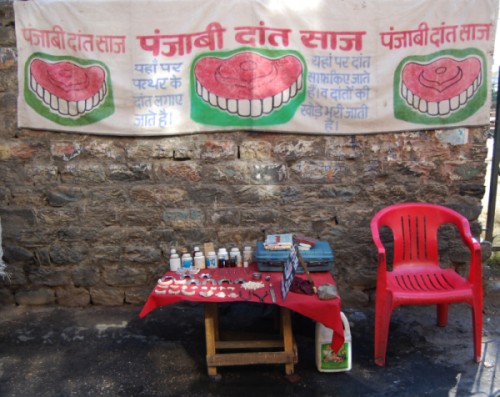
Above, a mountain dentist- click for a larger detail of his tools.
When it comes to orienting myself in the space-time continuum, figuring out directions or remembering them, I am infallible because I am always & ever: wrong.
It isn't that I can't remember the appearance of a route in order to regress along it, or repeat it on another occasion, indeed, I remember every detail all too well but simply never where, or when, I've seen it before.
One old friend hypothesises that this is precisely why I travel so much: I am simply lost.

Despite this genetic handicap, in fact: congenital, my Dad & Sis are the same, I never buy maps or make any overt effort to compensate the disadvantage, to learn a new place's layout, because it is actually an advantage, it is what leads me to corners I never would discover otherwise since I wouldn't look for them. And it is precisely while asking how to get somewhere from someone without a common language that allows the first acquaintances which aren't commercial with the people of a place.
Buses
I would probably just get a flight down to Bombay for a week of fun
& relative luxury before heading back to Europe except for one
problem: on my way up in Udaipur, I found a very beautiful miniature
painting after looking at several hundred (open in
new window)
but it was deservedly expensive & we didn't manage to meet on a
price. Since leaving it behind, however, it hasn't left my thoughts
& I realize I must go back for it.
 Going
to pick it up is not only a great distance out of my way but the
transport available is limited. Getting out of Himachal Pradesh means a
couple of bus rides with a change to more comfortable sleeper trains
out of Delhi. I bought a ticket out of Manali on a bus officially
called the Super-Deluxe & in fifteen
hours of mountain
road was unable, even by accident, to nod off a moment as we were
frequently thrown as much as about 8 inches off the steel-frame seats
into the air as our driver barrelled maniacally down the mountains
under a shining full moon. I learned quickly not to try to rest my
tired head on my palm for fear I bite my tongue off.
Going
to pick it up is not only a great distance out of my way but the
transport available is limited. Getting out of Himachal Pradesh means a
couple of bus rides with a change to more comfortable sleeper trains
out of Delhi. I bought a ticket out of Manali on a bus officially
called the Super-Deluxe & in fifteen
hours of mountain
road was unable, even by accident, to nod off a moment as we were
frequently thrown as much as about 8 inches off the steel-frame seats
into the air as our driver barrelled maniacally down the mountains
under a shining full moon. I learned quickly not to try to rest my
tired head on my palm for fear I bite my tongue off.
The bus stopped frequently to let people on & off
whether there
was room or not. On my right a young man either on drugs or simply dead
tired from very hard work, seemed able to sleep even as he flew in the
air & crashed back down on his seat. Lamentably he kept
snuggling
up on my right shoulder & snoring his halitosis in my
direction. On
my left, a Saddhu with staff & what appeared to be serious
gastrointestinal issues, while on the floor a smily old woman leaned
against my legs.
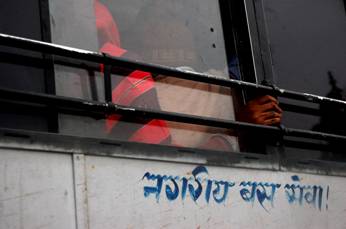
From time to time we stopped also at shacks along the road where they
would bring the ancient & rattling heap to re-inflate the
alarmingly bald tyres.
I gritted my teeth for another bus out of Shimla knowing I would grab a room in Delhi to shower & sleep a few hours before the afternoon bus to carry on south to Jaipur in. There had been no tickets in first, second or even third class in trains coming out of Delhi so I bought a ticket on the snazziest bus there was, the sleeper bus. The agent in Manali showed me photos of it, a monstrously large Volvo with roomy, reclining, upholstered seats under large, lit compartments with beds & clean linen. More than a bus it looked like the inside of an ocean liner. I am on it as I write this but I could tell as I walked up to it I would be disappointed because it is actually an Indian Tata, not a Volvo, whose interior reminds less of ocean liner than Soviet era submarine.
So it is from a narrow seat with filthy & ragged upholstery, the window streaming with vomit from the person in the sleeper above, where I now write. Going to pick up the precious little painting is taking on a decided sense of pilgrimage.
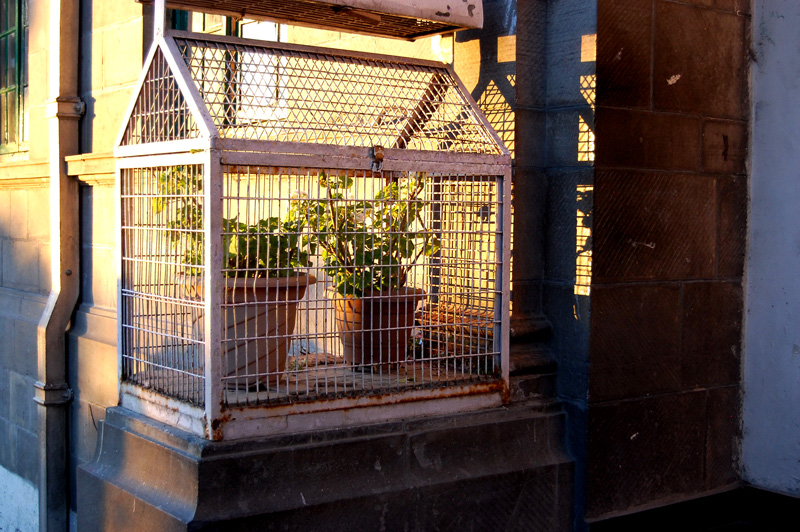
In the small mountain town of Shimla, the capital of Himachal Pradesh, people keep their potted flowers in cages to protect them from the monkeys.
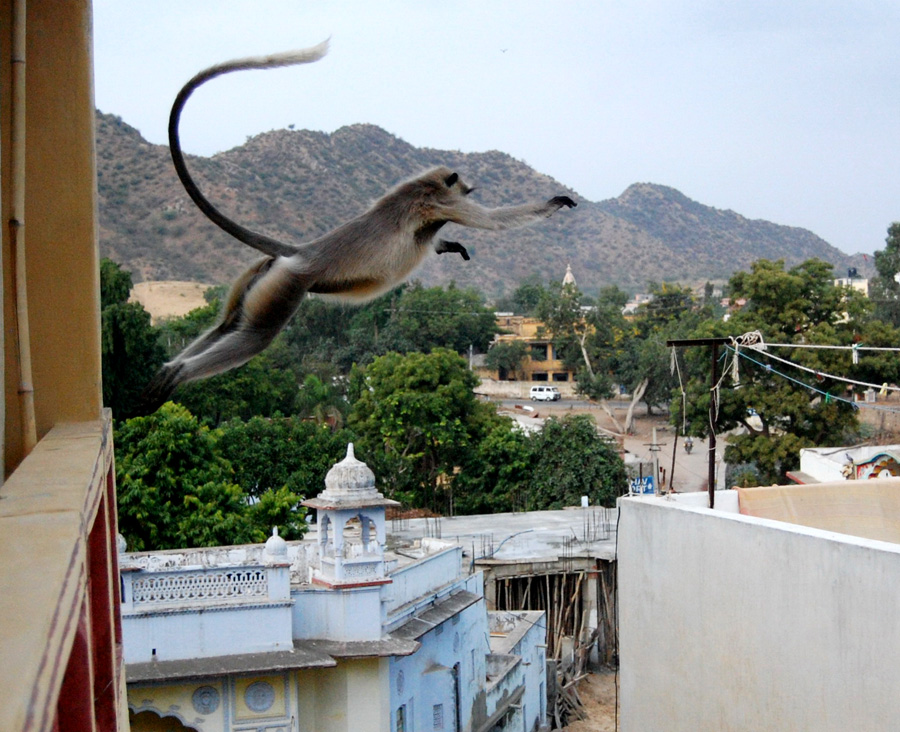
Losing my sense of humour
 My
brief day in Delhi brought home all that makes India difficult on the
tourist: having to fight for the correct price on every transaction.
My
brief day in Delhi brought home all that makes India difficult on the
tourist: having to fight for the correct price on every transaction.
To start with one must trivialize his interests so far as to learn the prices of everything & since everyone, everywhere, overcharges the foreigner, discovering the prices requires a slow & undignified process of bickering over it, whether it be a beer in a bar or the price of a room in a hotel, & each type of thing must be bought repeatedly before one gets a real idea, time not available to a tourist.
In the case of something common, purchased every day like a cup of chai, if one doesn't make it clear when ordering it that despite being non-Indian he knows it costs 5 Rs, it is not that they will charge double for it, a figure that is still shruggable, but will ask ten or even twenty times more instead, which is not only expensive but also offensive.
Especially when it, like so many old traditions, has turned the ubiquitous glass of black tea made with milk & flavoured with cardamom, lemon grass, ginger & black pepper into what is now no more than watery tea with too much sugar & in most places nowadays, to add insult to injury, it is served in tiny thin plastic cups that replace the clink-clink-clinking of glasses in their wire baskets that used to sound in the streets everywhere boys delivered them from the chaiwallah sitting over his boiling pot.
Most of the time I pay & shrug-off the price & the battle. The rest of the time I walk away neither buying what I wanted nor haggling over it. But I know that every time I pay an inflated value out of a sense of pride or an abhorrence of the petty, I encourage the two price system. Refusing to buy what I want; making myself petty over the cost of each purchase; or shrugging off the Indian's absence of fair play or fair mark-up, inevitably builds resentment.
The Indian, unlike say, some Muslim countries, do not even do it well. Where a Moroccan will make a jocular game of it that might even end in Arabic hospitality, (the best in the world) the Indian turns it unpleasant & mealy, he will act ill-used, elicit pity or express disgust & as often as not will hesitate before naming a first price even when he sells only one item in his shop, obviously thinking over the highest price he might get away with while you stand there waiting & feeling the full import of the difference between being a valued client & a sucker.
 The
Indian seller seems convinced that if a buyer is foolish enough to be
fooled, he deserves to be treated like a fool & that money
earned
at the expense of his ignorance gives the merchant the right to pride
for being cleverer than a fool.
The
Indian seller seems convinced that if a buyer is foolish enough to be
fooled, he deserves to be treated like a fool & that money
earned
at the expense of his ignorance gives the merchant the right to pride
for being cleverer than a fool.
Delhi's broad poverty is no different than other of India's big cities but it has lost the glee that marks Bombay's chaos & cacophony with charm. The difference might be no more than that of a port city & a landlocked one but Bombay's nonchalant giggle is matched by Delhi's grimness.
India is losing its global innocence, its childish curiosity, its humble admiration. It is not only the cultural impact a large influx of foreigners cause, but also its economy as a whole, while most of the world is in recession India's economy rose by 7.9% this quarter. The effect is double fold, on the one hand I notice a chip on shoulders, so much as to say: if I lived in your country you would not be able to compete with me. In your country you pay twenty times the price of a chai for a cup of coffee & you do it without complaint.
On the other hand I see the growing economy & global awareness replacing the traditional cultural imperative of acceptance, with ambition; ambition for change & this attitude weighs heavily on the Indian character.
Wherever tourism spends its money (out of proportion with the local economy) India loses her pride to unashamedly cheat or beg. Regular middle-class children will ask for Rupees as they pass & I wonder at their smiling mothers who don't reprimand them.
I am lucky to be able to start conversations, however halting, which in most cases humanize the interaction because without a sense of humour to reach through the murk as one person to another, one would leave India with the feeling that here, one is no more person than a walking wallet can be.
The final sign of tourist induced decadence is that the food is better in any poor street stall than restaurants with ambition to attract the European. Cumin, Coriander, Cardamom, Ginger, Gurum Masala & even garlic, the very flavours of India, are removed. Even when one is prepared & asks for chilli before-hand he will be asked: "little? Medium? Or a lot?"
"I like Indian food the same as you, make it the same" but even then he will assume he understands your taste better than you do. I told one restaurant owner after a bland & flavourless meal: "Along with the rise in price for foreigners comes a savings in ingredients" & added: "if I want good Indian food nowadays I guess I must go to London."
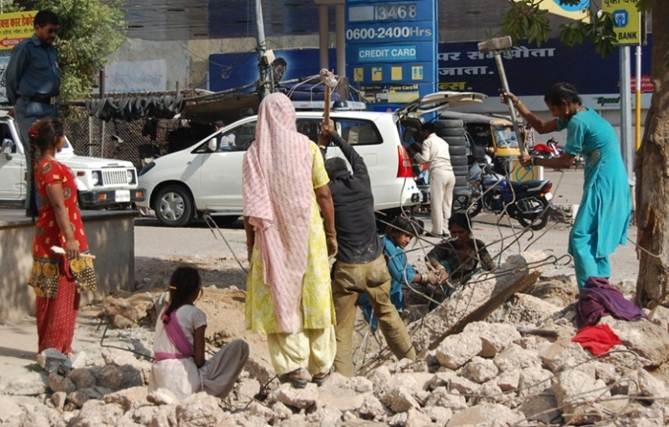
This hard-working family, left, have not been hired by the city of Delhi to break up pavements as it might appear, in fact they are opportunistically taking advantage of the work being done to salvage the rebar in order to sell it.
Dec 3, The Dogs of Udaipur
Phew! That was some slog, I hadn't been on a bus in years & after these 50 arduous hours of freezing cold, stinking unpleasantness on wheels, now, right here in public, I am going to solemnly vow I will never again get on another bus as long as I live.
But when last night's bright moon was followed by this morning's blood-red sun, it was over Rajasthan's desert & we soon entered Udaipur's frilly marble fantasy.
I came back to the little palace-turned-hotel where I was greeted by the owner like a long lost friend & taken to a lovely suite on an upper floor away from the interior courtyard's noise (& I didn't have to quibble over the price). As I sit writing this on my little balcony through whose lattice work ladies of the court used to look out on the world, without the world being able to look back, half a dozen centuries ago, I am already forgetting the torturous journey even before I've had time to wash its dirt off.
The sun is going down & through my window overlooking the lake, a disembodied voice from some minaret calls us to prayer; tonight, while the town lies abed the dogs of Udaipur will bay at the moon & I will turn in my sleep just as I'm sure Emperor Jehangir did when he stayed here.
I still have more than a week before catching my 'plane in Bombay, I think I'll spend a few days warming up & relaxing here.

Despite Udaipur's hassle of harassing shop owners (&
entrepreneurial non-shop owners) constantly trying to sell me
something, I am enjoying it a lot & making  acquaintance
with people from here. If they simply asked one into their shops as he
passed, it
would be tiring enough, but instead they accost one as he walks down
the
street & opens conversation with something courteous. To which
one
has the choice of either responding politely to be quickly led to a
proposal to spend money or, answer his courtesy with something
rude to shorten the process.
acquaintance
with people from here. If they simply asked one into their shops as he
passed, it
would be tiring enough, but instead they accost one as he walks down
the
street & opens conversation with something courteous. To which
one
has the choice of either responding politely to be quickly led to a
proposal to spend money or, answer his courtesy with something
rude to shorten the process.
Today I decided to have a long walk down to the nineteenth century park, Sawal Newis, for half an hour of quiet. My mind was elsewhere as I entered by the big gate & the city noise rapidly faded to be replaced by squawking parrots cavorting in pale viridian, surly crows in deepest black & the silent eagles circling flapless & aloof above. In the end the afternoon was easily spent among the park's old trees, sharing paths with young lovers & families in elegant, swaying sarees. I followed the tiny train tracks that carry a toy train full of kids back & forth from the small zoo.
As the sun fell I headed back thinking to see how the tailor progressed with my order but became, of course, fortuitously lost. And so it was I discovered the group of houses hidden behind a small ashram, where the throw-away clay water pots in use everywhere are made.
Below: an Adobe Flash animation made from a series of photographs of a potter at work.
The wheel is simply a piece of stone spun on a conical fulcrum with a stick. The potter could shape about three vases before having to encourage the stone's momentum again. The iron-less clay dries grey but is adorned with a terracotta wash & sometimes the old woman who paints them will also add a simple decorative pattern in white over the rust-red.
The Russian
Last night I went out for a drink & before I knew it my lonely table was surrounded, a nice young aeronautical engineer who designed Cessnas for private clients, a solicitor from London & my new Indian acquaintances, when a big Russian came up & asked in a surly way: "are you Russian?" one of the prejudices I have picked up from my travels is a liking for Russians, a passionate & serious people with whom one can laugh more easily than most, so I answered: "no, but I am drinking Vodka [they had no Whiskey], why don't you join us?"
He stood nearly a head taller than me, big-boned, square-jawed & heavy-browed; we reached an easy, drunken, intimacy quickly & when he confided: "I feel a lot of fury inside" I told him if he felt a need to fight he could fight with me. He thought the idea so funny he laughed uproariously as he lifted me to my feet & gave me a hug!
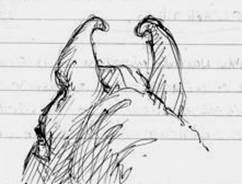 We
drank Vodka with abandon till sun-up & today, head still
aching, he
rang to ask if I wanted to do something together. I suggested we get
out of Udaipur:" let's rent horses & see a bit of the
countryside."
We
drank Vodka with abandon till sun-up & today, head still
aching, he
rang to ask if I wanted to do something together. I suggested we get
out of Udaipur:" let's rent horses & see a bit of the
countryside."
We took a cab out to the Maharaja's estate (the uncle of the present Rana) where we were surprised by the superb quality of the Marwari horses available to rent. Tall of leg, small headed, strong & lean in body, fiery in nature with a detail bred-in, typical of the Indian aesthetic, their ears curl at the tips facing each other.
Igor, the bloody Russian, turned out to be a consummate horseman, he galloped his horse back & forth across the landscape whooping, legs akimbo like an ancestral Cossack. My horse, young & strong & so tall I could not reach my stirrup from the ground, ached to follow & I felt quite decidedly the difference between us, unlike my fiery stallion I was neither young nor strong, nor tall either.
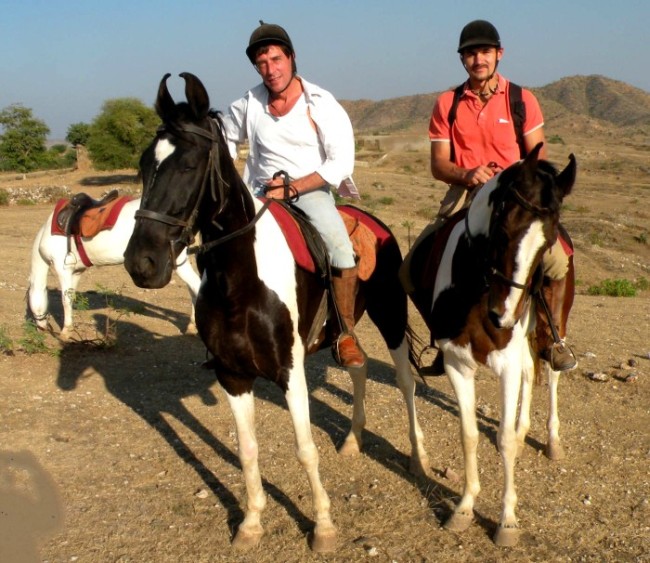 We
had a great afternoon riding through some of India's rare countryside
with only the couple of small villages, so remote everyone in each came
out to wave at us as we passed.
We
had a great afternoon riding through some of India's rare countryside
with only the couple of small villages, so remote everyone in each came
out to wave at us as we passed.
Egon
The friend who has been taking care of my dog back in Spain, my lovely Egon, tells me that she stopped eating & that within a week of my leaving was in such alarming condition that she took her to Ana, our vet.
Ana found her hypothermic & hypoglycaemic & diagnosed separation anxiety. She gave her some injections & some treats with whatever she needs in them that are, apparently, simply irresistible to a dog even if it is bent on suicide by starvation. It seems they have worked so well that she has begun bringing my friend offerings of dead chickens, conveniently at hand in their live version from the neighbour's.
There is no love like a dog's love.
The rickshaw driver
Udaipur is gorgeous as much for its landmark palaces & millenary temples as its stinking back alleys where men beat silver into leaf to decorate desserts, old women tend their Persian goats & marble cutters goad stone into the shapes of wild gods. In the evening the Muezzin's call to prayer from the minarets answers the bells rung by Hindus as they enter between work & supper.
It is also, at least to the helpless tourist, maddening. Today
I
spent the day walking, always aware the motorized vehicles expect the
pedestrian to give way on the roads they share—the danger is constant
& as long as they miss you & regardless of how close
they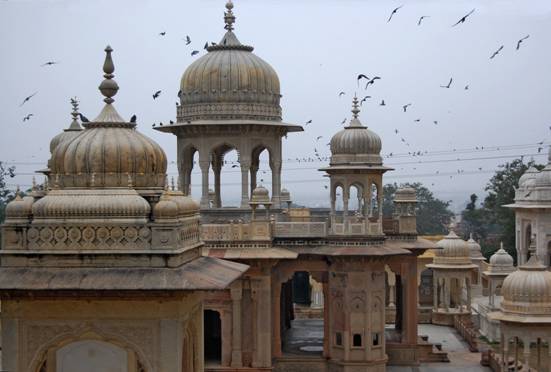 come, it is considered fair play. I was talking to a friend on the
sidewalk-less street as close to the buildings as possible when a
rickshaw misjudged the millimetre he needed to miss my shoulder as he
passed. I wasn't hurt but it spun me around & knocked something
from my hand. My temper snapped.
come, it is considered fair play. I was talking to a friend on the
sidewalk-less street as close to the buildings as possible when a
rickshaw misjudged the millimetre he needed to miss my shoulder as he
passed. I wasn't hurt but it spun me around & knocked something
from my hand. My temper snapped.
I reached into the rickshaw & wrenched the driver, stumbling, out by the neck, 'motherfucker' escaped my lips & I noted vaguely that he carried a family in the back. I was still focused on the man I held when I noted that over his shoulder I could see the driver sitting behind the handlebars—but I mentally shrugged it off as irrelevant. Almost immediately I realized: wait a minute, if I am holding the driver, why is he still sitting in his vehicle? Then it hit me: I held the husband & father who had sat with the driver because he didn't fit in the back seat with his women. "Sorry, sorry", said I mortified, & by the time I had straightened his clothes a little, my anger was gone & it was too late to grab the driver too.
 Dinaz, my old love
Dinaz, my old love
Back in Bombay & just as I did the first week of this trip I will meet the woman again with whom I came closest to getting married back when we were in our twenties. Our last meeting had been eight years ago in Spain & now Dinaz, my little Dinaz, is grey-haired. She is also NUTS! A bundle of contradictions, kind & rude, vulnerable & peremptory, considerate & overbearing, elegant & gauche, but she is above all, brilliant.
Among her many accomplishments she makes films. Yeah! Big-budget feature length films with some of Hollywood's top actors. But I still think the first was the most charming, maybe you've seen it, it was called Salaam Bombay. When she was working on that film I remember her saying it was easier to get the street-kids they used, to act, than it was to get the professional actors to behave naturally. With some of the monies from Salaam Bombay she began a foundation for street children which she still runs personally though there are now five centres at locations all over India. I am proud of her.
She told me that a French director called her to say he was making a film about death. He was interviewing scientists, spiritual leaders, theologians, & wondered if Dinaz knew of some Indian guru with an original slant that might be interesting to include.
Dinaz said: "We believe in reincarnation here (premised on an extinction of ego unlike the afterlife insinuated by Christianity or Mohammedanism) a guru will tell you the same thing any Indian street kid will". The French director thought this a great idea, went to India & interviewed street kids about their thoughts on death. So among his panoply of experts, spiritual counselors & brilliant scholars, appear these Bombay street children saying: "You're going to die yaar, it doesn't matter how much medicine you take, you're going to die so just forget about it."
One night she asked if I knew about the 'new India' & when I said no, she took me to the opulent new opera house & a world-class restaurant with a New York chef where our meal cost what it would take our waiter six months to earn.
She also took me to the Lady Willingdon club bringing back a flood of memories from our years together twenty years ago. Lady Willingdon was the wife of the Viceroy of India in the 1930's. When accompanied by a Maharaja to their club in Bombay even they were not allowed entry. At which Lady Willington reputedly commented: "The Maharaja has more culture in his little finger than you have in your entire club" & she went on to found her own club out of the Gymkhana (1875) where Indians were permitted & could, furthermore, become members. Although women couldn't until recently, they were always part of the club as part of the family of a male member.
In the midst of Bombay's screaming turmoil, behind greenery & walls, one wouldn't suspect sits this oasis, this island of manicured golf course, genteel dining, cocktails poolside & my favourite: the silent, cool warmth of the paneled billiards room, white-gloved spotters beside monumental oaken snooker tables brought by ship & train all the way from Europe back when Victoria's sun never set on the empire, & where today, Bombay's privileged sons wager old money.
Dear Dinaz, Dini, my old Di, it was nice to see you again, meeting at occasional intervals during a whole lifetime is instructive & as the mind is sexier than the body, the years have augmented your beauty.
Madrid
I was in Arcos de la Frontera for a couple of weeks & I thought I was finished with this journal but it looks like I will be stuck here in Madrid for three days. After my dog & I stood in the queue for more than two hours, Delta airlines informed me that I arrived at the counter too late to load my dog, inside her big cage & drugged with the doggie valiums my vet gave me for her.
It is interesting how a dog in unusual circumstances like a hotel or airport, becomes a fascinating exotic animal to children & adults alike.
To the right a sketch of a passenger who, like me, waited for a connection out of Atlanta airport. How different beef-fed Americans are to lentil-fed Indians!
Los Angeles
Now I am in southern California which in comparison to India, feels very far from reality, the simple reality of being a human creature living on the earth. Here everything is packaged neatly, securely, cleanly, comfortably... I guess that if in India the man whose foot is shod in a shoe feels all the world is carpeted in leather, then perhaps here, where it really is, the fortunate man should walk barefoot.
click here for more photos of India
HermanStudios.com © 1999-2014 All rights reserved